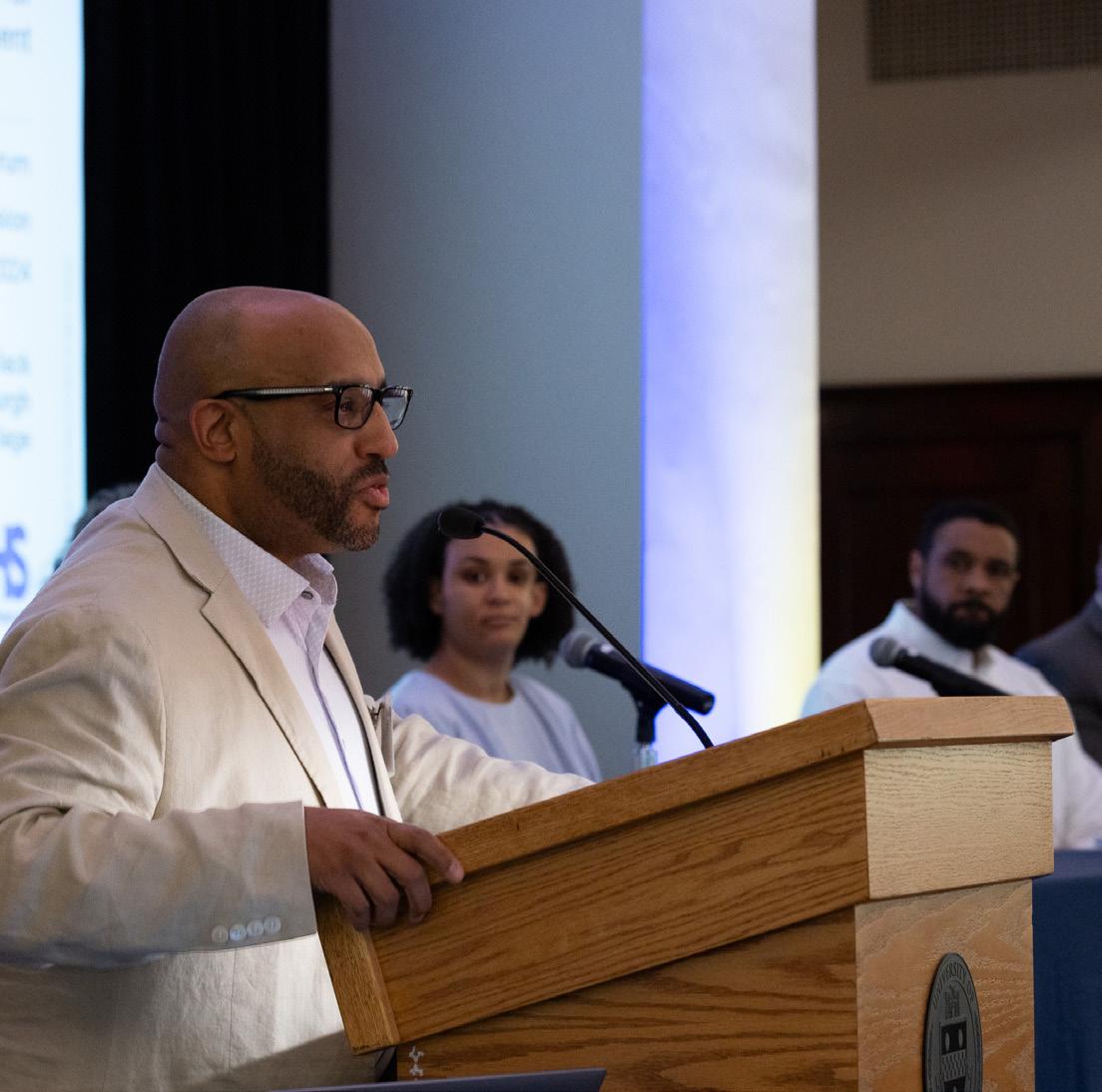







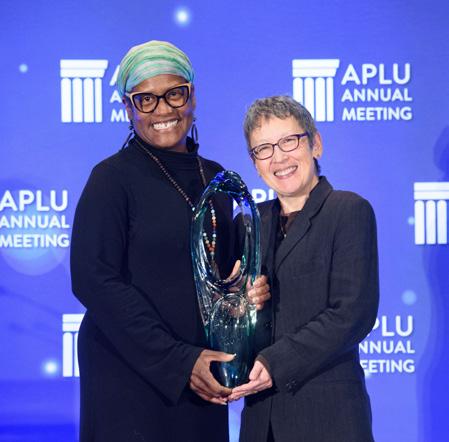






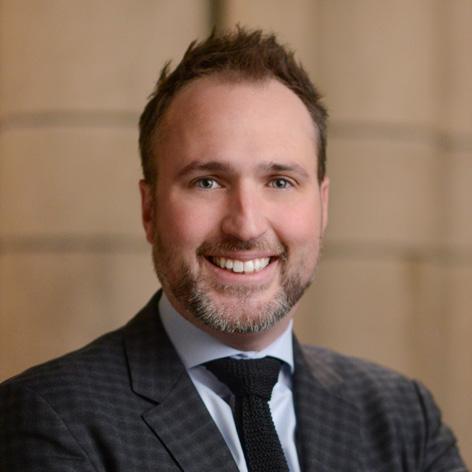
KEVIN WASHO
Senior Vice Chancellor for University Relations
What defines a great university? Its academics and buildings; the research that helps propel innovation; the commitment of its people in fostering community and belonging; and a long-standing culture of connection and collaboration, of course. Importantly, a great university is also the students, faculty, staff and researchers who are working to ensure that the surrounding communities have the tools they need to succeed in every stage of life.
The University of Pittsburgh fits the definition of a great university. We are deeply committed to being a positive force, not just as an academic institution, but as a dedicated community partner and anchor to the economic and social progress of Southwestern Pennsylvania.
We know that it’s possible at Pitt: to build long-term community capacity, to ensure opportunity is widely shared and to improve lives at every scale. Because Pitt’s progress is not just our own—it’s progress that belongs to everyone.
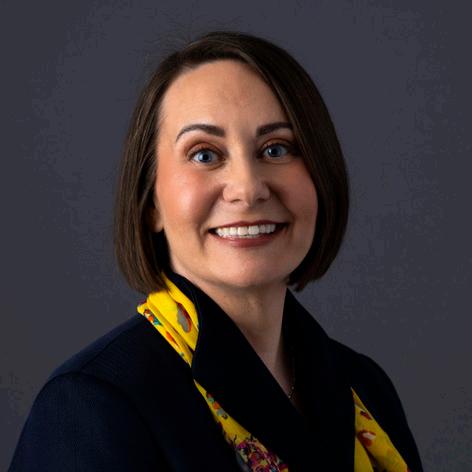
Vice Chancellor, Engagement and Community Affairs
We call the Office of Engagement and Community Affairs the “starting point” for community engagement for a reason. We convene, coordinate and connect to ensure Pitt’s engagement efforts have maximum impact. We serve as a designated listener for Pitt in regional civic discussions and an impact multiplier.
But we are also a relationship builder. Partnerships—both with our University colleagues and in our communities—are key to our work of ensuring that local businesses can thrive; our youngest learners can excel; our neighbors experience health; and our communities feel stronger, better connected and deeply valued. When we foster mutually beneficial relationships, we work with our communities, not just in them.
As a community-engaged, anchor institution, Pitt is uniquely situated to help make a difference in the well-being of our neighbors. This report exemplifies just some of the hundreds of extraordinary partnerships and programs that are happening across Pitt and within our region. They bring new light to what it means to be welcoming and engaged—a principle that we, as a university, are excited to live by every single day.
The Office of Engagement and Community Affairs (ECA) is the core unit at the University of Pittsburgh with responsibility to advance a community engagement strategy for the University, to ensure that Pitt is a partner and asset to the region, to mobilize the University’s response to communityidentified problems and concerns and to support faculty and staff in delivering sustainable and substantive engagement and outreach activities.
Everything that ECA does ultimately has a single purpose: to make it easier for communities, public leaders, faculty, staff and students to forge meaningful and more effective collaborations.

Cross-functional efforts that establish the framework and strategy necessary for the University to mobilize its expansive engagement resources including engaged learning and development, convening capacity, social capital and public service and volunteerism so that Pitt becomes a partner of choice in regional progress, particularly addressing the social determinants of health
Cross-institutional efforts to advance Pitt’s role as an anchor within the region, harnessing the economic demand of our purchasing, construction and hiring to create paths of economic opportunity for residents in our local communities
Pitt’s flagship place-based community partnerships focused on the Oakland, Homewood, Hill District and Greater Hazelwood neighborhoods of Pittsburgh, which provide long-term commitments of staffing, infrastructure and coordination to facilitate mutually beneficial collaborations between Pitt and the local community
A dedicated, nurturing intellectual environment for older adults (age 50 and better) that offers hundreds of enriching courses, lectures, tours and other opportunities for social interaction and engagement throughout the year
» A hub and convener for faculty, staff, researchers and community-engaged programs—meeting systemic problems with coordinated, holistic responses.
» A designated listener for Pitt in community and civic conversations across the region.
» A facilitator of partnerships and coalitions based on a shared vision of action.
» A connector for regional economic growth and planning to local educational, workforce and business development opportunities.
» A leader, coordinator and maximizer of Pitt’s expansive commitments in Oakland, the Hill District, Greater Hazelwood and Homewood.
» And an impact multiplier—working with organizations that are working for stronger communities, throughout the city and the region, and sharing the resources and capabilities of Pitt.
2023-24
5,607
91,851 volunteers contributed hours of volunteer service
3,716 HOURS tutored through PittEnrich
$477M+ in direct construction and non-construction spend with suppliers and vendors in the 10-county SWPA region
124 programs and events offered at the Community Engagement Centers
1,318 active OLLI members
329 faculty and staff received dedicated community engagement support
163 new staff employees hired from Oakland, Homewood, the Hill District and Greater Hazelwood
10,976 total unique visitors to the Homewood and Hill District CECs since opening
300+ OLLI courses, lectures, tours and other opportunities offered
The Plan for Pitt 2028 helps to tell our story:
who we are, what we value, where we’re going, how we’re getting there and why It’s Possible at Pitt.
It’s a plan grounded in values, defined by excellence and focused on elevating our community’s aspirations.
The plan offers actionable and measurable initiatives and outcomes that will invest in people and ideas, accelerate our momentum and ensure Pitt’s best days lie ahead.
1. We will cultivate student success.
2. We will propel scholarship, creativity and innovation.
3. We will be welcoming and engaged.
4. We will promote accountability and trust.
5. It’s Possible at Pitt.
Maintain the Carnegie Classification for Community Engagement, the country’s most visible and selective recognition of community engagement efforts in higher education, through the American Council on Education.
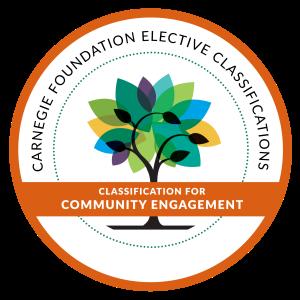
Intensify Pitt’s commitment to Buy, Build and Hire LOCAL by hiring more of our neighbors, helping businesses grow and awarding more construction, service and purchasing contracts across the region.
Expand and enrich youth educational opportunities through the Gismondi Neighborhood Education Program, a collection of programs and services provided to elementary-aged students in certain neighborhoods in Pittsburgh where Pitt has made a long-term commitment to community engagement.






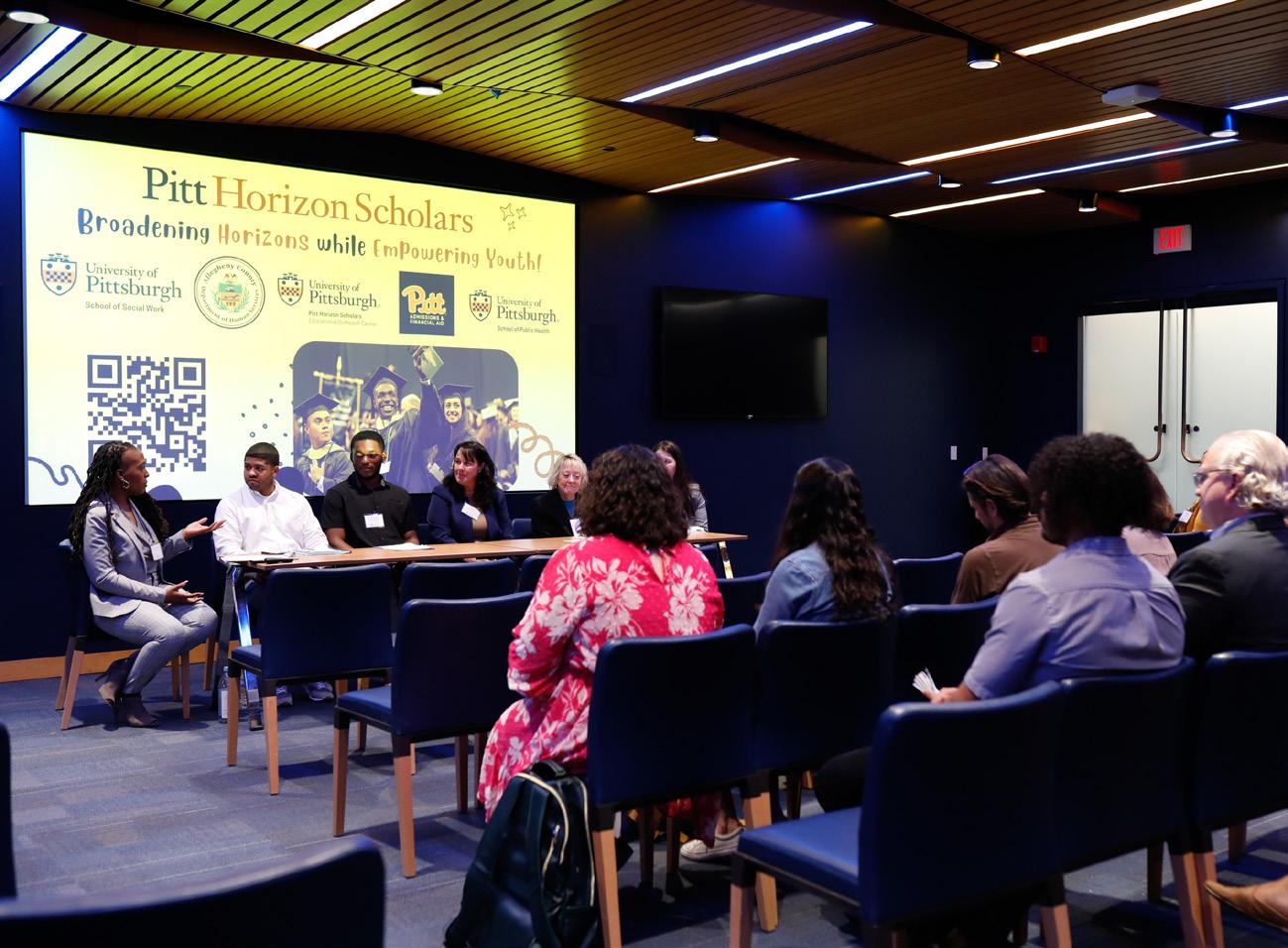
“Engaged scholarship” seeks to discover new knowledge through activities that collaboratively generate, exchange or apply academic and community knowledge and practices through partnerships between members of the University and members of the broader public.
Since 2019, the Community Engaged Scholarship Forum (CESF) elevates, celebrates and reflects on collective approaches to community-engaged scholarship through the development of sustainable partnerships that build deep, reciprocal processes to achieve mutually beneficial, community-identified priorities.
The full-day event features workshops and keynote speakers that exemplify the definition of community-engaged scholarship: exploring and reflecting on the work and research being completed while inspiring and discovering future opportunities to improve our communities’ well-being and accelerate our region’s progress.
Each year at CESF, Pitt celebrates students, faculty and staff who have significantly impacted their communities. Part of these celebrations include awards that recognize outstanding partnerships and individuals that are exemplars of community engagement.


Kelsey Voltz-Poremba, CScD, MOT, OTR/L Assistant Professor, Department of Occupational Therapy
School of Health and Rehabilitation Sciences


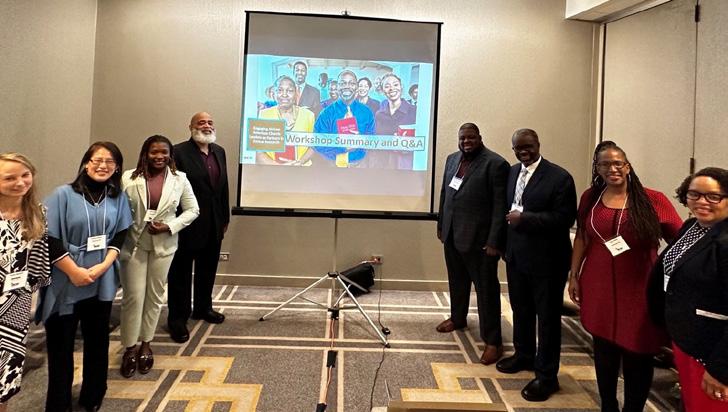
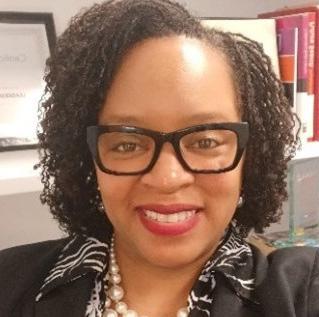
Aliya Durham, PhD, MSW, MPIA
Assistant
Professor and Director of Community Engagement
School of Social Work
The primary objective of Appalachian Bridges to the Future is to unite Pitt faculty via the David C. Frederick Honors College with the Fayette County Cultural Trust (FCCT) to assess and begin to address the causes and consequences of the outmigration of higher educated and skilled individuals from Fayette County, PA, an economically distressed area located about an hour’s drive from Pitt’s Oakland campus.
Central to this goal is the creation of a lasting, positive relationship with the FCCT and other community stakeholders that will allow the partnership to provide research and programmatic support to the residents of Fayette County while also addressing the program’s central research topics and providing an opportunity for undergraduate students to engage in ethical community-based research.
For more than two decades, the Grace Lamsam Pharmacy Program (GLPP) in the School of Pharmacy has been a beacon of compassion, delivering pharmacy services to the most vulnerable populations in the Pittsburgh region—those experiencing homelessness, the working poor, the underinsured and the uninsured.
Rooted in the belief that every person deserves quality health care and medications delivered with dignity, the GLPP has made it its duty to make this care available whenever possible.
The CHURCH project is a Community-Partnered Participatory Research (CPPR) project in which Pitt researchers collaborate with African American faith leaders in the Homewood neighborhood to develop, implement and evaluate a mental health training curriculum (e.g., Renew Your Mind) that can be delivered in Black churches.
The training includes four 90-minute training modules based on cognitive behavioral therapy principles, which have been culturally tailored by incorporating spirituality and African American sacred music through collaboration with African American clergy and local Black church musicians. The training seeks to increase faith leaders’ mental health knowledge and self-efficacy in educating congregational members about evidence-based strategies to manage mental distress resulting from daily stressors.
As one of southwestern Pennsylvania’s major employers, landowners, place-makers and partners, Pitt is an anchor to the economic and social progress of the region.
The Anchor Initiatives are a community-centered, place-based suite of strategies developed to leverage Pitt’s role as an anchor institution, which acts as a key convener for investment, ideas and impacts that are vital to the health and success of the region and the areas of greatest need.
As an integral component to the Plan for Pitt, the Anchor Initiatives amplify Pitt’s regional impact in the areas of buying, building and hiring locally; community engagement and partnerships; placemaking; and workforce development.

Navigating employment opportunities at large institutions like Pitt can be overwhelming, but Celiwe Jones is available to help. As Pitt’s workforce development career counselor, Jones offers career counseling, application assistance and workshops to connect residents in Pitt’s Neighborhood Commitments communities.
Jones provides direct support based on individual and community needs, guiding applicants through every aspect of the job search process, from discovering their interests to submitting applications to preparing for an interview. In doing so, she ensures that people aren’t just placed into jobs but finding opportunities for longevity and growth.
Buy, Build, Hire LOCAL
Hiring more of our neighbors, helping businesses grow and awarding more construction, service and purchasing contracts across the region
Investments in Housing Affordability
Partnering in community-led efforts to increase housing affordability and homeownership in Oakland
Connecting and Convening Workforce Development Efforts
Developing talent through a wide range of workforce development opportunities, including non-degree credentialing programs and certificates
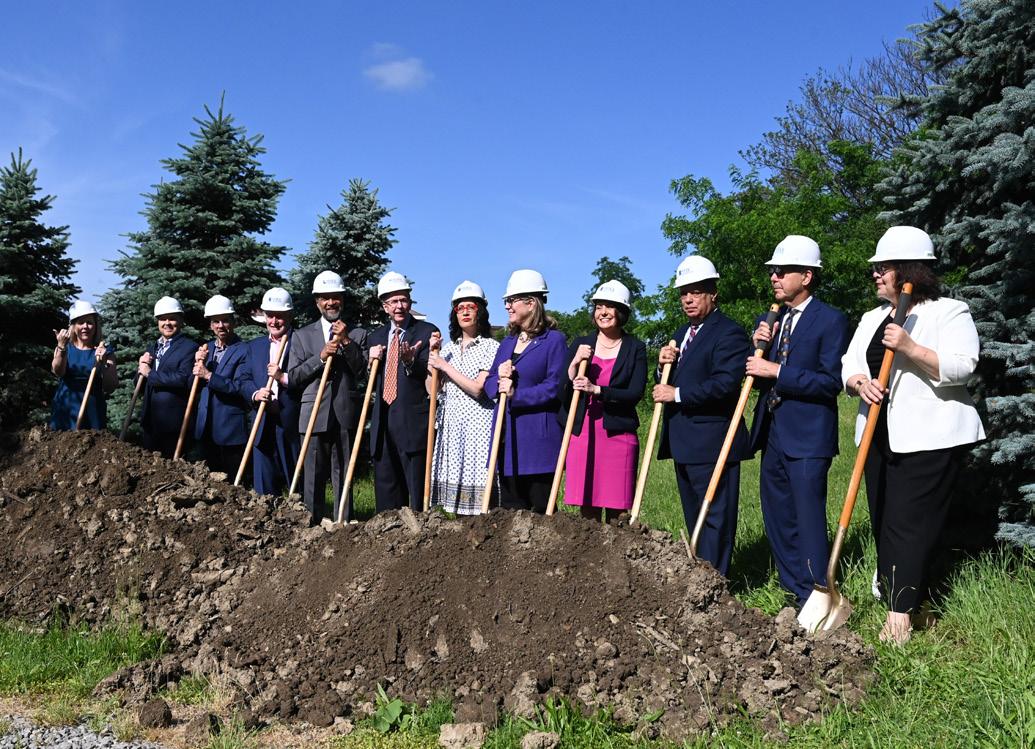
Neighborhood residents and community organizations gathered at Pitt to celebrate the groundbreaking for Mosaic Apartments—a 48-unit affordable housing complex near the corner of Forbes and Craft Avenues tailored for LGBTQ+ seniors—in May 2024 at the future location of the building.
Mosaic Apartments will provide residents easy access to the vibrant university neighborhood, museums and worldclass medical facilities. Crucial land donations, which were facilitated and finalized through Pitt’s Office of Real Estate, from UPMC, Pitt and Dialysis Clinic Inc. were instrumental in making the project possible.

There are no borders or boundaries when it comes to learning from each other and using that knowledge to address community challenges.
The Engagement and Outreach Map helps coordinate and track the progress of Pitt’s engagement efforts across the University of Pittsburgh system.
The map was developed and is maintained by the Western Pennsylvania Regional Data Center at the University Center for Social and Urban Research.

380 ENGAGEMENT AND OUTREACH ACTIVITIES ON THE MAP
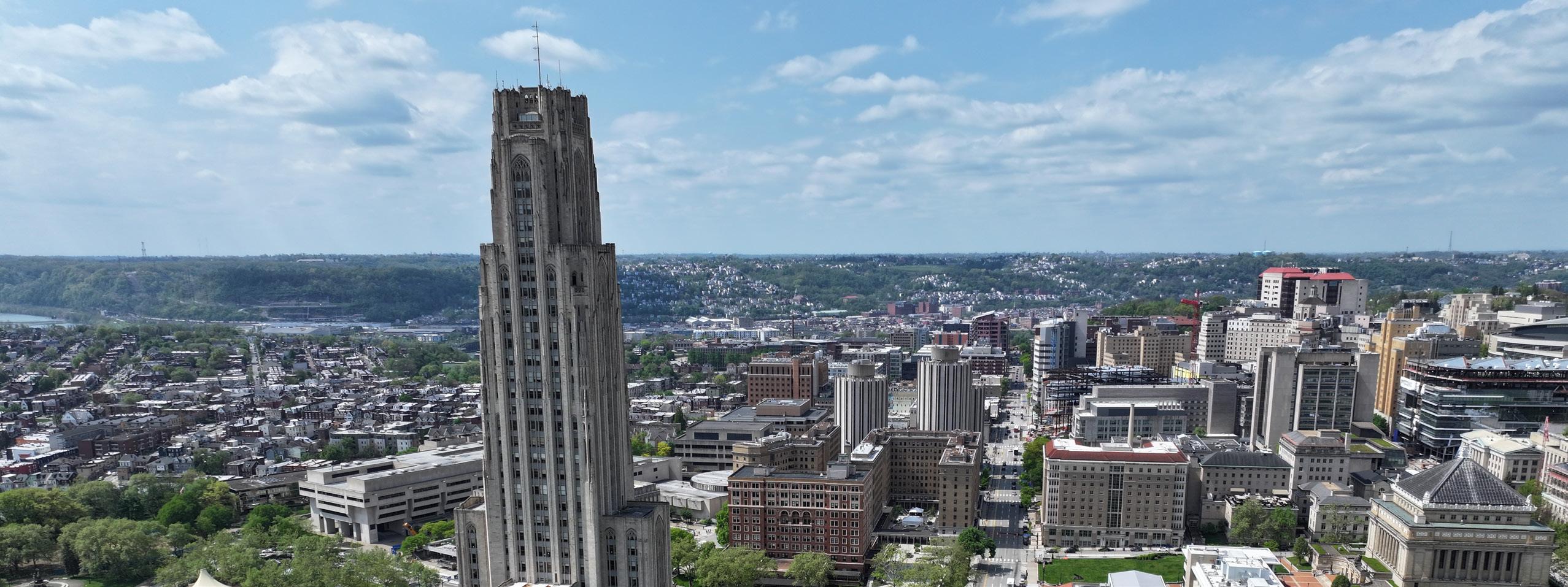

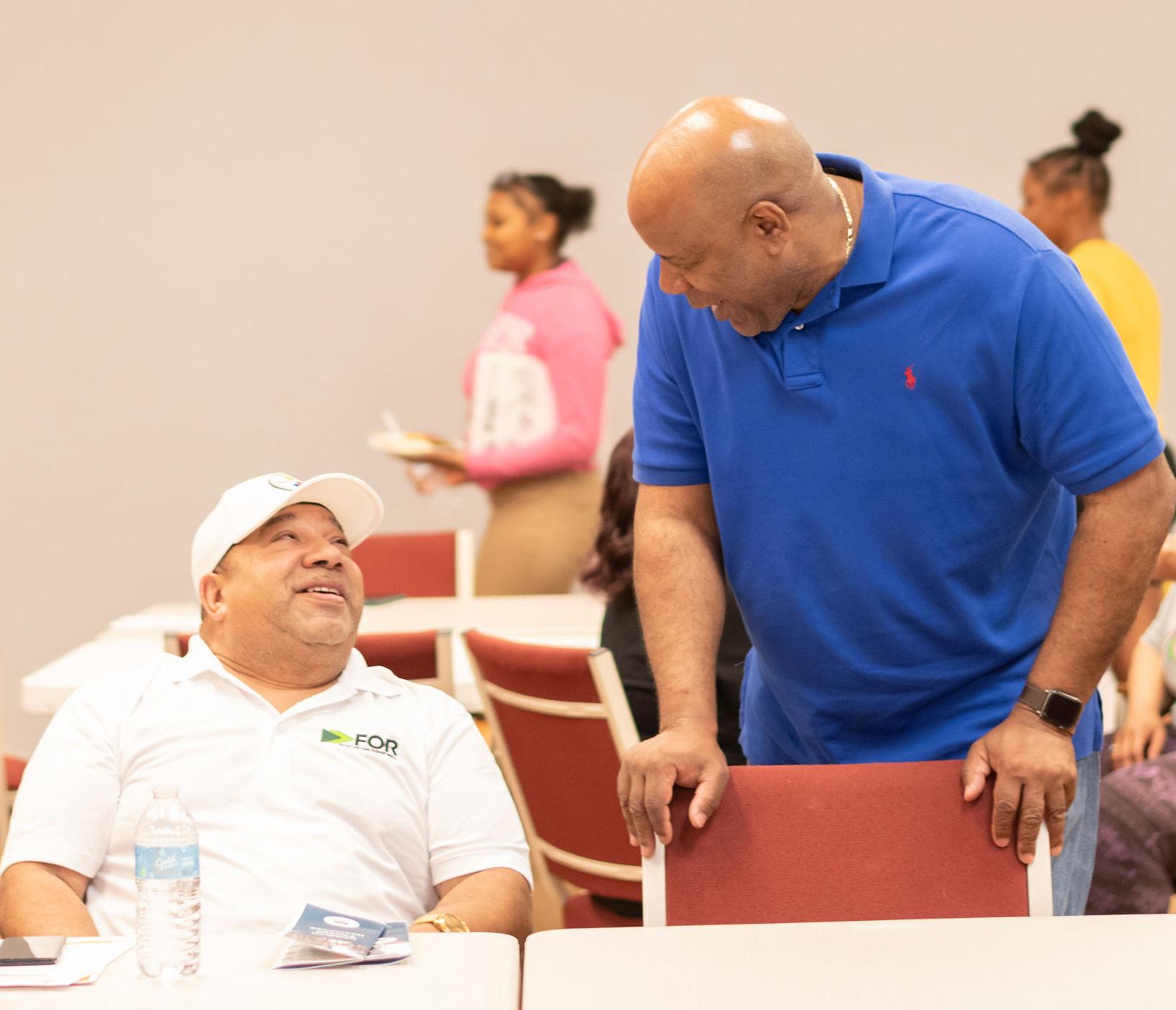




We know that it’s possible at Pitt to help create and sustain strategies and solutions that allow our communities to thrive.
Being an anchor to the region means being a source of support for our university and community partners and embracing the notion that those partnerships are the vehicle for achieving sustainable impact.
This report exemplifies just some of the hundreds of extraordinary partnerships and programs that are happening across Pitt and within our region.
COMMUNITY-ENGAGED PROGRAMS HIGHLIGHTED THIS YEAR HAVE INVOLVED OR BENEFITED:
631 PITT FACULTY AND STAFF
6,063 PITT STUDENTS
100,040
Our partners work to address challenges and conditions in our environment that have a major impact on people’s health, well-being and quality of life, also known as the social determinants of health—where people are born, live, learn, work, play, worship and age.
The 34 programs showcased in this report explore how, together, we are partnering to help our communities, and our region, succeed.
Increasing opportunities to access high-quality early childhood, K-12, career and technical training, higher education and literacy education
Community Connection and Support
Promoting positive, supportive, non-discriminatory relationships that improve social cohesion and digital equity
Neighborhood Safety and Sustainability
Building safe, clean and green environments and public spaces, including public transit
Improving access to respectful, culturally-appropriate, high-quality health care and pharmacy services
Financial Stability
Reducing poverty through education, employment and basic needs (e.g., food access, affordable housing, etc.) support
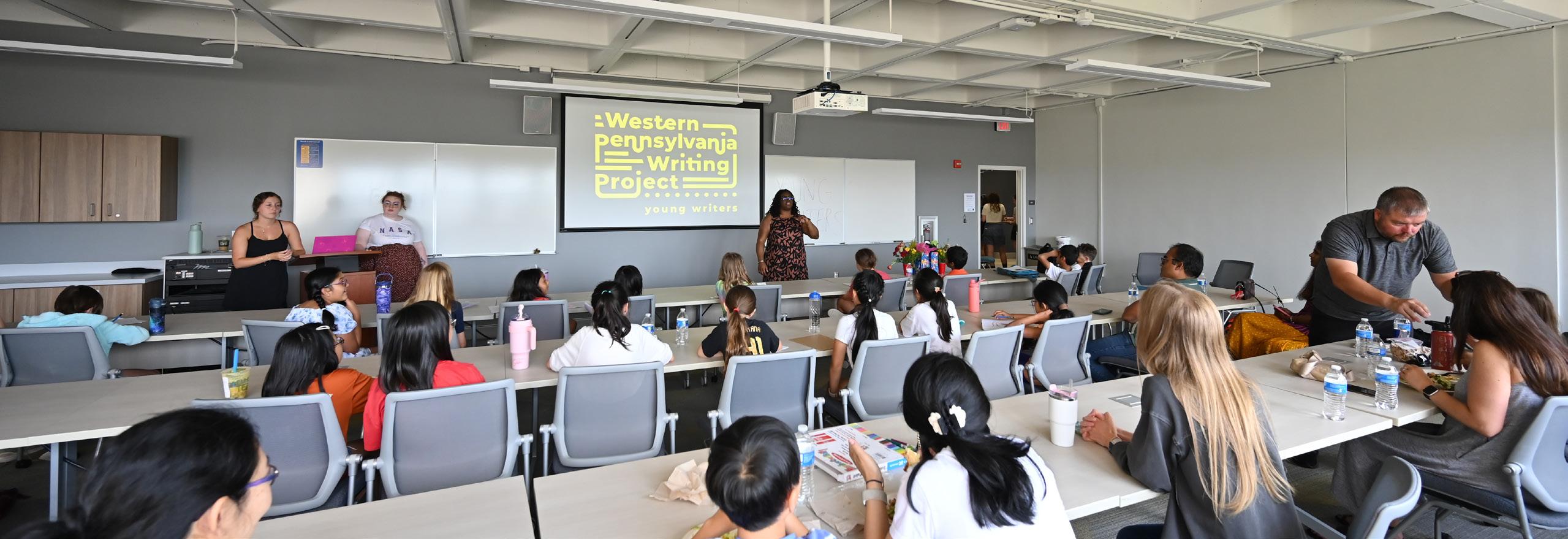

The Western Pennsylvania Writing Project (WPWP) is celebrating its 40th anniversary in 2024.
As a part of the National Writing Project and sponsored by Pitt’s School of Education, WPWP has spent four decades providing professional development workshops to hundreds of teachers—across multiple generations— during the summertime to sharpen their skills, share promising writing and literacy pedagogies, spark curricular innovations and celebrate success.
As noted by Dr. Khirsten L. Scott, Pitt Education assistant professor and new director of WPWP, it is critically important to continue supporting teachers over the summer by creating communities that extend outside the classroom.
“We tapped into the boundless imagination of our educators, which had a tangible impact on their teaching,” said Scott.
In 2023-24, the WPWP network experienced significant changes, including a leadership transition to a new director and the addition of an administrative assistant.
Both personnel changes marked a pivotal moment for WPWP, helping to advance their goal of actively rebuilding connections and addressing engagement gaps that arose due to COVID-19 disruptions.
As a result of these changes, WPWP was able to revive a four-week summer institute for teachers, which was held in person for the first time in three years, symbolizing a return to its core mission of collaborative learning and professional development.
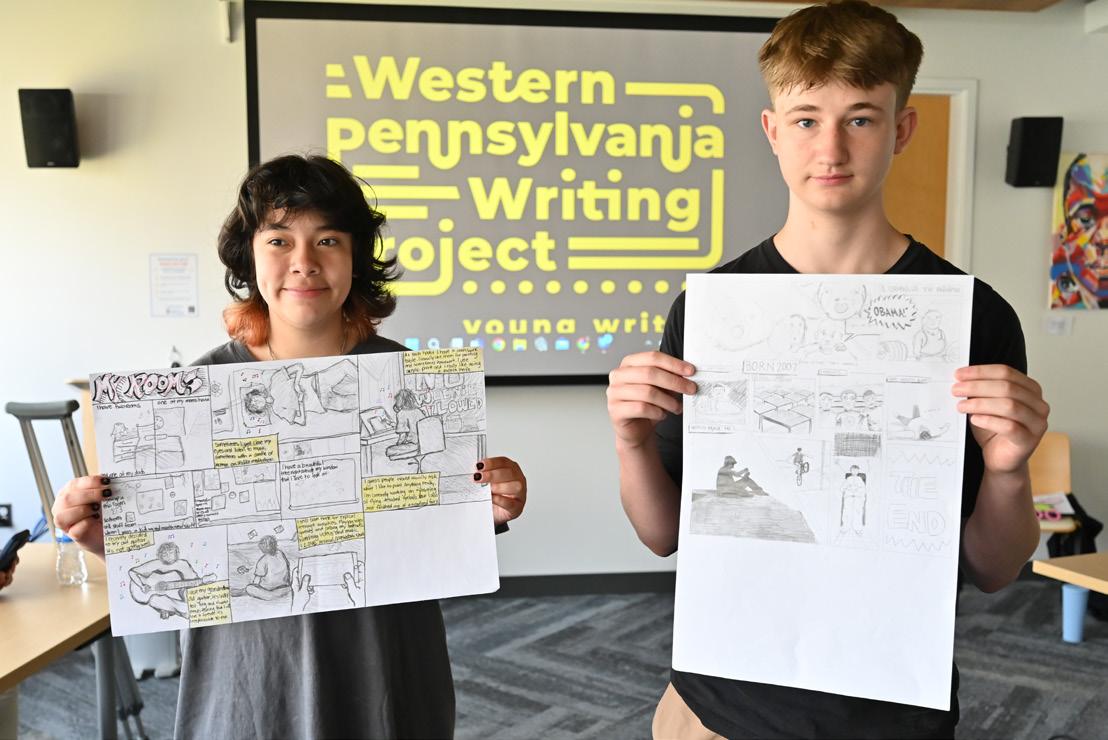

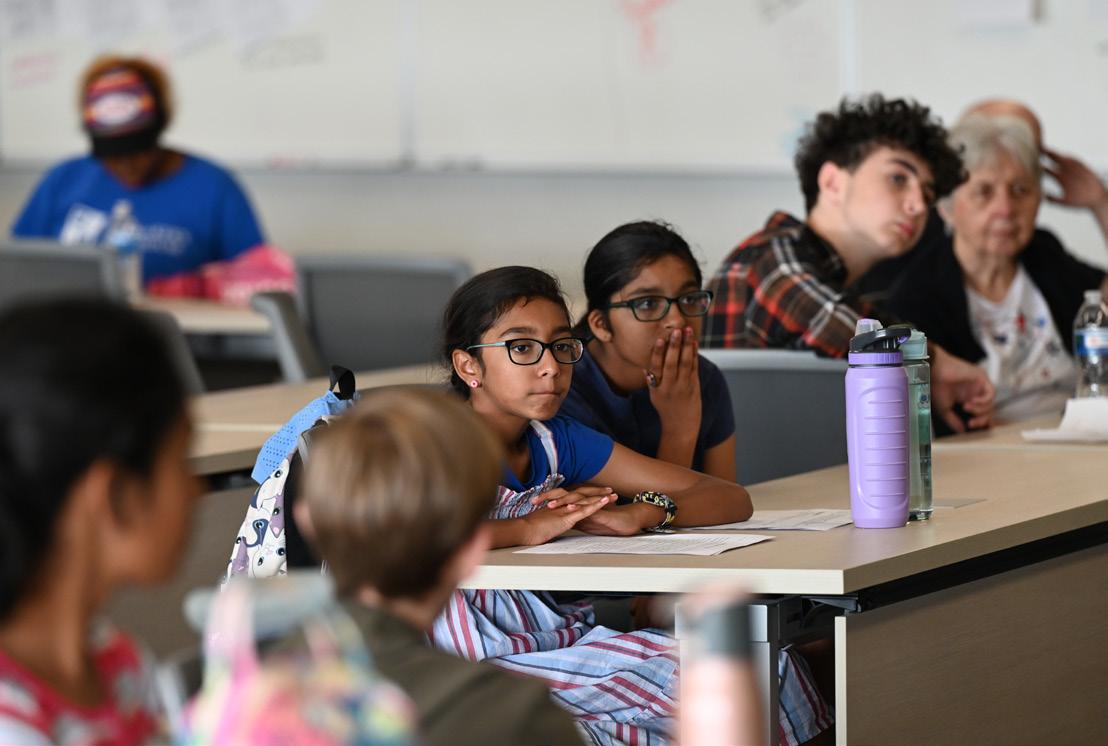

[As] these young women move through life stages, they carry forward the lessons and empowerment they received, creating a ripple effect that can transform communities. They become role models and change-makers, breaking cycles and laying the groundwork for future generations to thrive. This contributes to building a robust, supportive network within the community, essential for fostering an environment where Black girls can aspire to and achieve success.
– Dr. Khirsten L. Scott, Founder, HYPE Media
By harnessing the power of digital media and storytelling, HYPE Media aims to create a space where the stories of Black girls and their communities are not just heard but celebrated.
HYPE Media supports Black girls at Pittsburgh’s Westinghouse Academy in Homewood, grades 6-12, to redefine their stories and fight back against negative stereotypes by developing their digital literacy skills and participating in civic engagement.
Since 2019, the students have worked on social media campaigns, podcasts, community projects and Wikipedia edits, and they have shared their work through presentations and publications.
In 2023, the first HYPE Media cohort graduated from high school—a significant milestone. The graduates are now transitioning into adulthood, progressing in their education journey and marking triumphs for both their individual goals and for HYPE Media’s mission.
A comprehensive evaluation, which included surveys and indepth interviews, was conducted to ensure that the program is meeting the specific needs of the girls (e.g., fostering critical thinking, resilience and leadership skills) and is rooted in evidence-based practices. It helps significantly in tailoring the program to be more effective for its members.
Dr. Jamilah Ducar, assistant vice chancellor of The Engaged Campus in the Office of Engagement and Community Affairs, and Dr. Khirsten L. Scott, assistant professor in the School of Education and director of the WPWP, were recognized by Campus Compact in 2024.
Ducar received the Nadinne Cruz Community Engagement Professional Award, which recognizes not just an impact on campus but contributions to the community engagement movement at a broader scale.
Scott received the Ernest A. Lynton Award for the Scholarship of Engagement. The award highlights exemplary engaged teaching and research.
“It is clear that Dr. Scott is making a significant impact through public service within Pitt and across the region,” said Dr. Eboni M. ZamaniGallaher, Renée and Richard Goldman Dean of Pitt’s School of Education. “She is a shining example of our school’s mission to learn with and from communities, to commit to educational equity and to ignite learning and strive for well-being for all.”


Every child is capable of both learning and succeeding and, with proper care, they can do so.
Celebrating their 30th anniversary, HealthyCHILD–CHILD standing for CHildren with Individual Learning Differences–has been creating supportive environments to help children across Pennsylvania who are at risk for or who have developmental, behavioral and mental healthcare needs.
The HealthyCHILD model empowers caregivers, teachers, staff and administrators with trauma-sensitive, culturally responsive, social-emotional learning strategies and interventions to buffer the impact of trauma and chronic stress on young children from birth to second grade.
Social and emotional learning is the process through which children and adolescents, as well as adults, learn skills to support and maintain healthy relationships, which is crucial to the development and caretaking of young children.
As a pre-K teacher in the Pittsburgh Public School District noted, HealthyCHILD has been a great resource to their Early Childhood classroom; it has provided the instruments and skills to support all of their children.
One notable accomplishment this year was the launch of HealthyCHILD Social Emotion Learning (SEL) Resource hub, which contains tailored social and emotional learning resources for families and educators.


Community members interested in careers in clinical research may not know how to get started in the field. Where do they begin? With the STricklAnd Research Training program, also known as START. Pitt’s Clinical and Translational Science Institute (CTSI) and Bidwell Training Center co-developed the START program–aiming to train and hire medical assistant students for long-term employment positions in clinical research at the university.
Tuition, textbooks, uniform (if necessary) and any special supplies required for training are covered by the Bidwell Training Center. Pitt staff have also participated in Bidwell’s mock interviewing event to provide helpful feedback to students on securing employment. To date, seven START graduates have been hired by Pitt, four of whom have recently celebrated their first work anniversary.



Osher Lifelong Learning Institute at Pitt Office of Engagement and Community Affairs
In the heart of Oakland, amid the bustle of 20-somethings at the University of Pittsburgh, you’ll find a unique community of learners that looks a little different than the average Pitt student.
Among them, are individuals like Helen and Robert McAfoos, who moved from Forest Hills to Oakland eight years ago just so they could be closer to Pitt’s Osher Lifelong Learning Institute (OLLI)—an educational and social program for adults 50 or better taught by current and retired faculty members.
OLLI helps these eternal students keep their minds sharp, enables them to interact with curious peers and fosters connections that extend beyond the classroom. Since its start in 2015, thousands of older learners have participated in the program. OLLI Director Lisa Sharfstein says, “The program exists for people who love to learn.”
Helen and Robert McAfoos’ careers were very technical, they share. “We never had the time for things like literature, history and the arts.” With OLLI, the couple has been exploring and embracing new subjects for

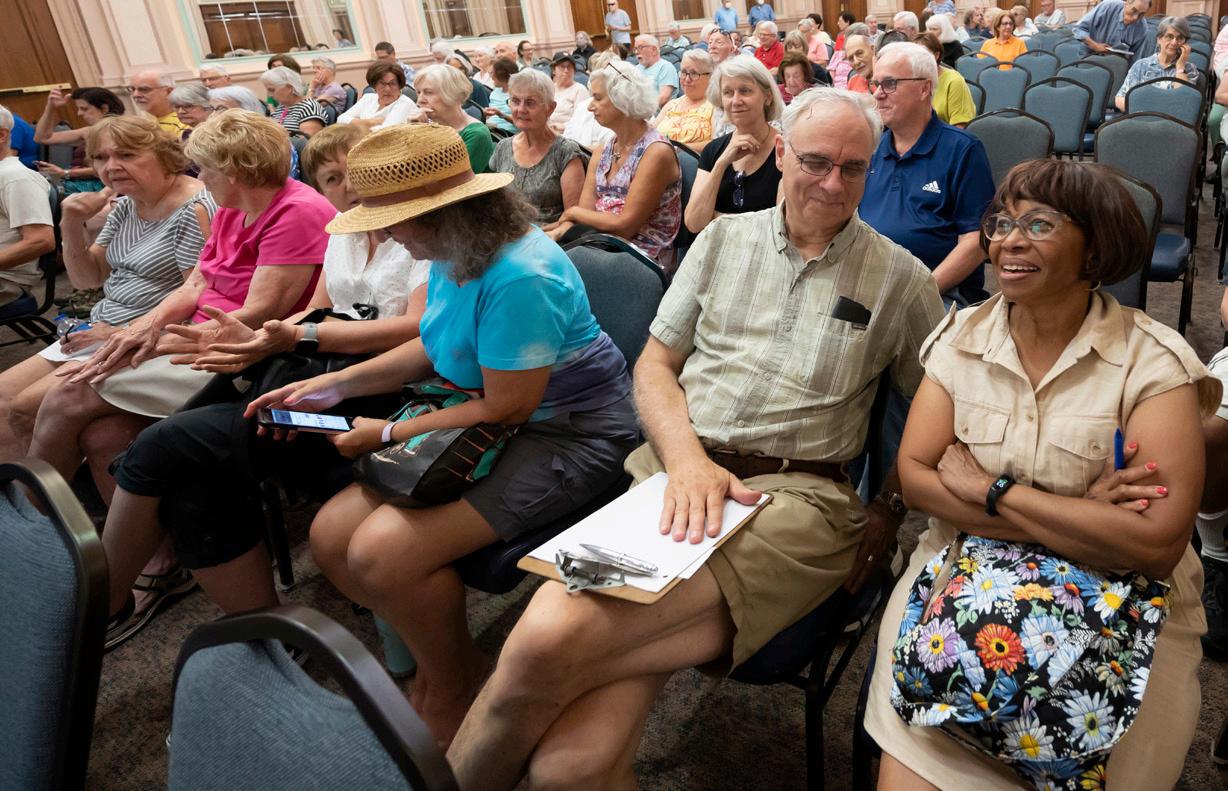
1,318
300+ COURSES, LECTURES AND TOURS EACH YEAR
over a dozen years by taking “terrific classes” from “marvelous instructors,” says Helen.
Not only does OLLI offer courses, but members can also benefit from trips outside of the classroom, both local and international. Members Linda and Fred Newman started their learning journey seven years ago after moving to Pittsburgh from North Carolina.
The variety of topics OLLI offers keeps the couple engaged, and they have taken field trips to enhance their learning experience. On top of that, joining the program has introduced them to like-minded individuals they can now call friends.
OLLI at Pitt has established yearly membership and instructor surveys to assess engagement, areas of improvement and perception of program value with these key stakeholders to provide the best experience for all involved parties.
On the membership survey, 92% of learners were highly willing to recommend the program to others, contributing to OLLI’s lifelong goal of rekindling the love for learning.

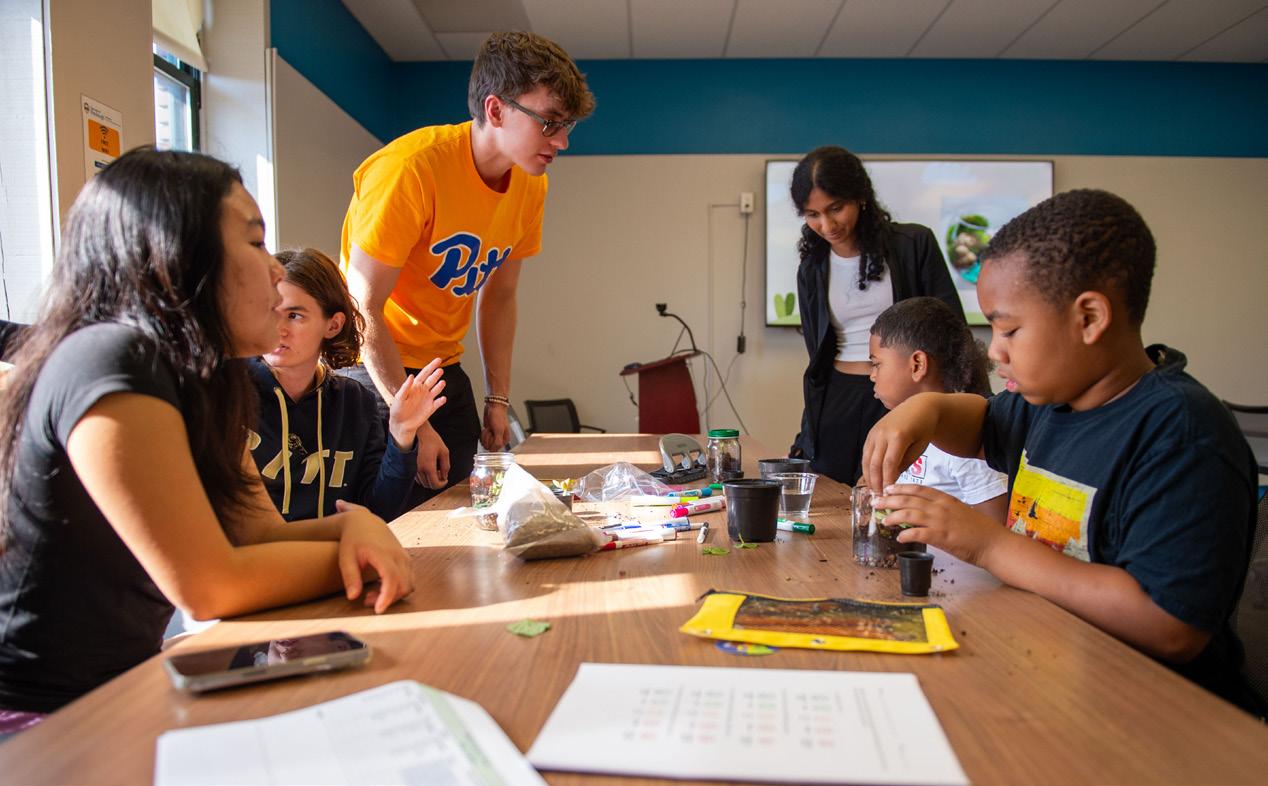


The Gismondi Foundation—created by Pitt trustee John Gismondi and his wife, Lisa—has topped the $1 million mark in giving to the University of Pittsburgh to strengthen and expand the educational support it provides in school and out of school across its Neighborhood Commitments.
The Gismondi Neighborhood Education Program creates the core infrastructure and staffing necessary to sustain and grow elementary school and communitybased organization partnerships in Pitt’s Neighborhood Commitment areas; lowering barriers to family participation in various out-of-school-time programs through support, including transportation and meals; hiring and training Pitt School of Education students serving as tutors; expanding access to an instructional coach to assist tutors and enrichment providers to produce culturally centered, developmentally appropriate content; and much more.

“John and Lisa Gismondi originally supported the development of the PittEnrich program in our Homewood neighborhood commitment. By generously expanding their support, we are significantly expanding our impact in other communities,” said Lina Dostilio, vice chancellor of engagement and community affairs.
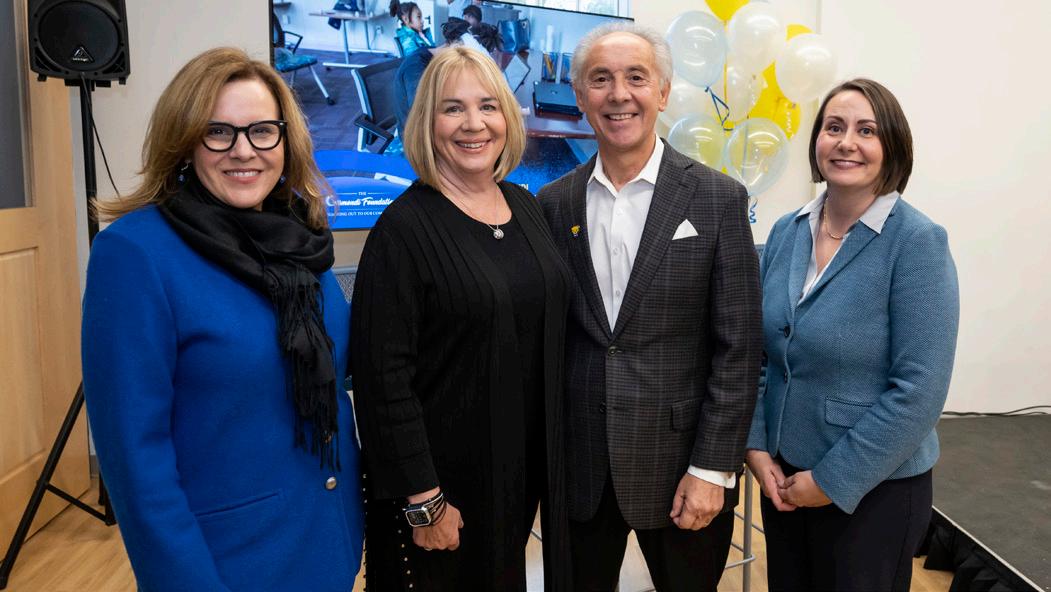
PittEnrich
Community Engagement Center (CEC) in Homewood Office of Engagement and Community Affairs
The Gismondi Foundation
You may have ridden a roller coaster, but have you ever built one? Saturdays at the CEC in Homewood are almost as loud and exciting as an amusement park itself while students discover basic concepts like momentum and speed as they assemble a roller coaster out of paper plates and glue sticks.
A program in the Gismondi Neighborhood Education Program, PittEnrich uses a unique blend of in-school tutoring and Saturday learning-through-play sessions to help Homewood students improve their reading and math skills.
During the school day, Pitt students provided tutoring in Homewood-
S.T.E.A.M. Studio
serving elementary classrooms, working closely with principals and teachers to ensure strategies align to the reading and math curriculum used by the Pittsburgh Public School District.
On Saturdays, more than 50 of the first- through fourth-graders are welcomed to the CEC to extend the learning, but in a fast-paced, fun way.
In 2023-24, 87.5% of participating students experienced growth in reading while 78% showed growth in math—proving that even though the students may be having fun, they are also gaining valuable education for their future.
Community Engagement Center (CEC) in the Hill District Office of Engagement and Community Affairs
The Gismondi Foundation, Neighborhood Allies, PNC Foundation, Roy A. Hunt Foundation
Though the acronym for “STEAM” has traditionally stood for Science, Technology, Engineering, Art and Mathematics, it means more for programming offered at the CEC in the Hill District—from the age ranges it includes to the topics it covers.
The S.T.E.A.M. Studio offers various vigorous programs to introduce youth to STEAM concepts but also subjects like entrepreneurship, media, architecture and more. Also included is the Digital Inclusion Studio, which offers adult coding and digital literacy opportunities.
STEAM Saturdays and Summer Camps, a program in the Gismondi
Neighborhood Education Program, aims to increase confidence, problem-solving skills and interest in STEAM careers to students in grades 3 through 8.
In addition to being offered at the CEC in the Hill District, STEAM Saturdays also take place in the Oak Hill and Bedford Dwellings housing communities via partnership with Housing Opportunities Unlimited and Macedonia FACE to provide transportation, allowing increased engagement with students.

3,716 HOURS TUTORED
574 STUDENTS PARTICIPATED
23 PITTENRICH TUTORS
S.T.E.A.M. STUDIO / 2023-24 PITTENRICH / 2023-24
109 STEAM SATURDAYS AND SUMMER CAMPS PARTICIPANTS
88 DIGITAL INCLUSION STUDIO PROGRAM PARTICIPANTS
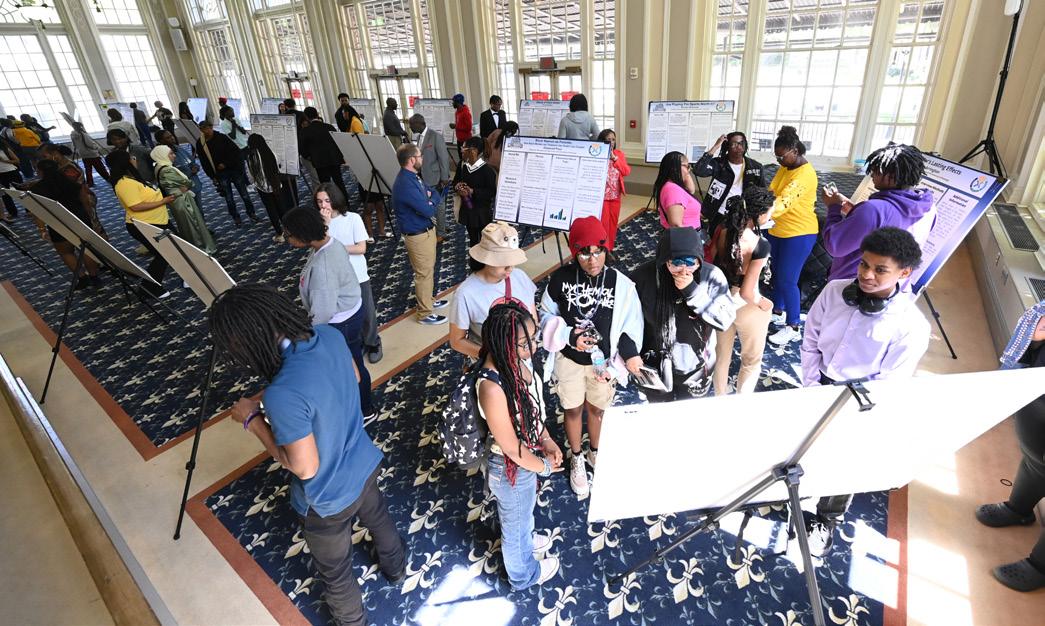
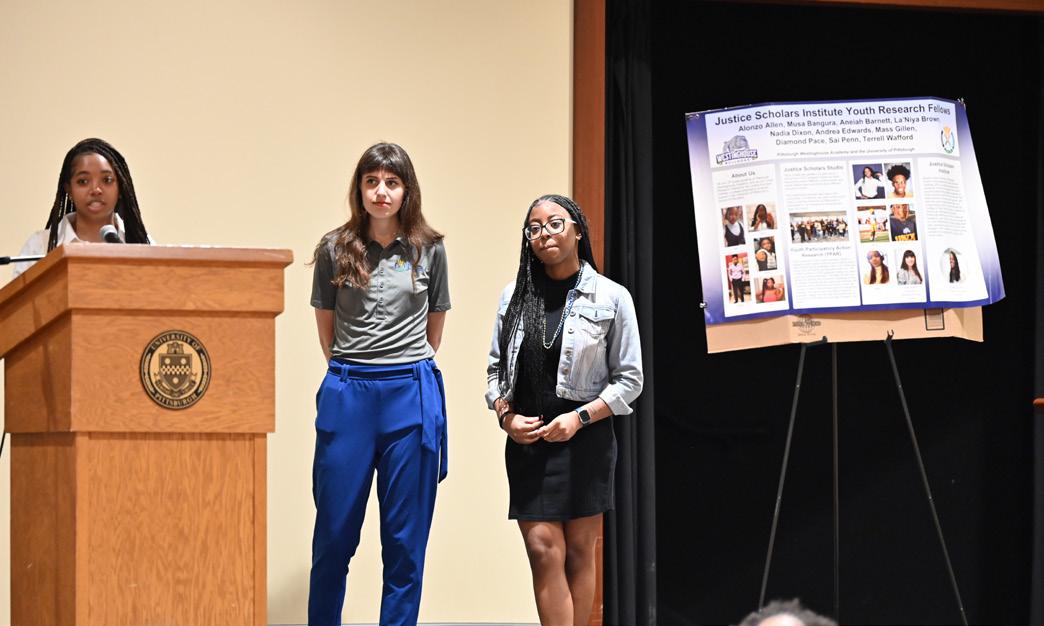

Giving high school students the resources to ready themselves for college allows them to tap into their full potential—becoming critical thinkers, learners and leaders.
The Justice Scholars Institute (JSI) is a social justiceanchored, community-engaged program that has worked with the College in High School (CHS) program since 2016 to provide a credit-bearing, college preparatory experience to high school students in three high schools within the Pittsburgh Public School (PPS) District.
JSI provides many educational enrichments, including college preparatory workshops and justice-focused youth development opportunities outside of school hours.
In addition to offering college credits through the CHS program, the Justice Scholars Institute provides high school students with real-world learning experiences and opportunities to visit campus and meet with college mentors.
Students at Westinghouse High School had the chance to visit neighboring universities, establishing relationships with admissions representatives and furthering their understanding of the college application process.
Despite the many barriers that PPS students confront and endure, according to JSI’s Founder, Dr. Esohe Osai, they “continue to want our assistance to help them navigate the college process and eventually make a lasting impact on their lives.”

The COVID-19 pandemic brought about a widespread uncertainty of the future that caused academic momentum to fizzle out, especially among those from underrepresented populations. The College in High School (CHS) program reignites students’ passion for learning and their drive for scholarly success.
For more than 40 years, CHS has been providing aspiring high school students who wish to earn transferable university credits with the opportunity to take highquality college courses that are taught right in their classrooms for a fraction of the cost of normal tuition.
But the CHS program offers more than just access to high quality college courses. Teachers, school
counselors and administrators are regularly surveyed to determine program effectiveness and best practices.
This direct engagement with faculty is paying off, as demonstrated by double-digit growth in 2022-23—a rate not seen since before the pandemic.
Additionally, CHS has taken steps to support their most underrepresented high school partners by deepening its affiliation with the Justice Scholars Institute, a college preparation and academic enrichment program serving Pittsburgh Public Schools high school students.


How do we protect marginalized youth from the school-to-prison pipeline? How do we reduce harmful disciplinary practices and improve the school climate? The Just Discipline Project (JDP) has some promising answers.
An optimal learning environment is one where relationships are strong, students feel connected and culture is essential. When these conditions are not met, the students can suffer, which can lead to more disciplinary action and less learning, especially for schools serving raciallyoppressed communities.
Through the provision of expert onsight personnel, research-informed professional development and a rich assortment of community building activities, JDP is designed to advance student achievement by implementing and evaluating school-based relational climate and restorative practice programs.
Across JDP schools, perceptions of school racial
climate, teacher connectedness and reductions in suspensions improve over time. Recent federally-funded randomized control findings have specifically demonstrated that JDP schools are outperforming their control group peers across the board—in discipline, climate and academic outcomes. These impacts have in many cases been remarkable.
In one JDP school partnership— Wilkins STEAM Academy in Woodland Hills—there was a 38% reduction in school suspensions in year one of full implementation, as well as academic gains in math and English Language Arts.
The Just Discipline Project has and intends to continue to partner with schools to help make school environments more relational, just and emotionally safe. In turn, these cultural shifts will serve to improve academic outcomes and reduce youth contact with harsh criminal justice systems.
Across 23 elementary, middle and high schools across Allegheny County, 700 healing circles + 2,200+ community circles were convened to address harm and conflict.
It’s about building a climate where students feel they belong, are cared for and ensuring structures within the [school] building let that happen.
– Dr. James Huguley, Associate Professor in Pitt’s School of Social Work and Principal Investigator for the Just Disclipline Project
Public Health Science Academy School of Public Health
In summer 2023, high schoolers immersed themselves in the science of public health at a monthlong program hosted at Pitt’s School of Public Health. Months later, two of the program graduates—eleventh graders Natalia Connor and Julian Whaley Miller—dove deeper and presented their research at one of the foremost scientific meetings in behavioral medicine.
The program—the Public Health Science Academy (PHSA)— offers high school students the opportunity to better understand public health challenges, such as poor air quality or how social media plays a role in youth nicotine usage, by undertaking research projects alongside faculty mentors.
Under the guidance of mentors Drs. Beth Hoffman and Jaime Sidani, Connor and Whaley Miller analyzed 300 YouTube “shorts”—videos less than a minute in length—for content related to vaping devices.

The research was part of a larger National Institutes of Healthfunded project awarded to Sidani to examine nicotine and tobacco misinformation on social media.
“Working with Natalia and Julian was a great experience for my entire research team,” Sidani said. The students, she noted, “helped us to hone some of our research questions. We were also excited to take a step back while they successfully navigated their own project with gentle guidance and are thrilled with their success.”
Although she wasn’t certain what public health was before she decided to apply to the PHSA, Connor now says she can imagine herself pursuing public health as a career. She plans to apply to Pitt’s Bachelor of Science in Public Health program once she graduates from Allderdice High School.
Whaley Miller, who attends the Pittsburgh Science and Technology Academy, is interested in studying microbiology and found the project equally engaging.
“We couldn’t ask for better ambassadors for the Public Health Science Academy than Natalia and Julian,” says Dr. Hannah Covert, co-director of the academy and research assistant professor in the School of Public Health. “Their interest and commitment to research surpassed all our expectations.”
Connor seconds that:
“Youth can make an impact. We’re as curious and committed as anyone else and our participation is important.”




Conversations about race are crucial to fostering positive identity recognition in Black youth, which is why the Positive Racial Identity Development in Early Education (PRIDE) program encourages parents and educators to engage and support children.
After a hiatus due to the COVID-19 pandemic, the PRIDE program relaunched their Pop-Up Mini Arts Festivals in the summer of 2023. One, taking place in August, was held in East Liberty, while the other event popped up in Homewood in September 2023.
Together with music, cultural dance, storytelling and other arts activities designed for Black children, they are taught to embrace their race and culture with love and honor.
The Parent Village program, which engaged parents and caregivers in learning and sharing about child development, Black childhood, identity development and Africana
arts and culture, gave parents and caregivers in the region a free, six-week program that helped them immerse their children in the sometimes-difficult conversations about race.
This year, parents asked for more information about African American Vernacular English (AAVE) and PRIDE delivered with a speaker and plans for AAVE-focused learning opportunities in the future.
The PRIDE team works with the Pitt Office of Child Development’s Evaluation & Research Team to ensure that community feedback is collected for each program, adjusting its programs accordingly when necessary. Feedback is consistently and overwhelmingly positive as PRIDE continues to engage hundreds of community members in the Pittsburgh region.

Manufacturing Assistance Center University of Pittsburgh at Titusville
Regardless of background and prior experience, the Manufacturing Assistance Center (MAC) offers training courses for those interested in a rewarding career in manufacturing. Courses are available either full-time for six weeks or part-time for 15 weeks at the Education and Training Center (ETC) at Pitt-Titusville.
Stephanie Fiely, ETC’s Executive Director notes, “The MAC is making an impact in our regional workforce, training youth and adults with the skills to understand manufacturing that employers are looking for in our area.”
Individuals receive instruction backed by a worldrenowned university. And, thanks to federal and state
funding and local scholarships, 94% of eligible students complete the course free of charge–giving them the chance to jump over the hurdles that make it difficult to work in the manufacturing industry.
At the start of 2024, the MAC received nearly $20,000 in grants to be used for scholarships to help support its trainees.
“These funds are a great investment in our community since graduates of these programs tend to stay in the region and contribute to the workforce and economic growth,” Fiely said.
How can students leverage their technical skills to make an impact in nonprofit organizations? Pitt’s iServe program is how. iServe aims to bridge the digital divide by connecting community partners with students to support meaningful volunteer projects.
The long-term partnership–a collaboration between PittServes and the School of Computing and Information–has had more than 200 students volunteer in the fall and spring terms to assist with projects such as designing and building websites, creating databases, maintaining social media accounts and tutoring.
In the AgeWell program at the Jewish Community Center (JCC) of Greater Pittsburgh, students tutor senior members, mostly in a one-on-one setting, on how to use technologies like smart phones and computers to support members’ independence and social needs.
Maddie Barnes, Director of Technology and EvidenceBased Programs at AgeWell, explains that members

often need help with the basics. While this may sound rudimentary, mastering basic skills like sending photos or emailing helps keep members stay in contact with family and friends and maintain meaningful social connections.
Barnes emphasizes that the partnership with iServe is mutually beneficial for JCC’s senior members and Pitt students. While members gain knowledge, students build valuable interpersonal skills.
“It takes a lot of patience,” Barnes said. “It’s a good experience for students to work in a professional setting with older adults.” In a world where technology is rapidly changing and an ever-present part of our everyday lives, the need for tech support in older populations is increasingly necessary, and iServe is ready to take on that role.

Center for Civil Rights and Racial Justice School of Law
The Center for Civil Rights and Racial Justice (CCRRJ) facilitates community-engaged teaching, research and service, and serves as a hub for Pitt Law’s commitment to addressing legal issues related to civil rights and racial justice.
CCRRJ recently launched the Community Scholars Program to legally and financially support community partners in engaging on important projects. Some of these projects include injection clinics with Allegheny Reproductive Health Center; a study on the impacts of
urban redevelopment gentrification with the Hill District Consensus Group; and extending the reach of some projects already being undertaken by Valley Clean Air Now in terms of environmental justice issues in the City of Clairton.
More than $15,000 in funding will be dispersed to such community organizations.
The Student Scholar/Summer Scholar Program was also launched to further graduate
students’ endeavors, such as advancing civil rights and racial justice through academic, research, legal or practical applications, during the summer.
Seven Pitt students were named CCRRJ Scholar Award recipients, and each have been awarded $1,000 grants to pursue issues that impact social justice.
RESIDENTS AND STUDENTS PARTICIPATED IN CCRRJ ACTIVITIES IN 2023

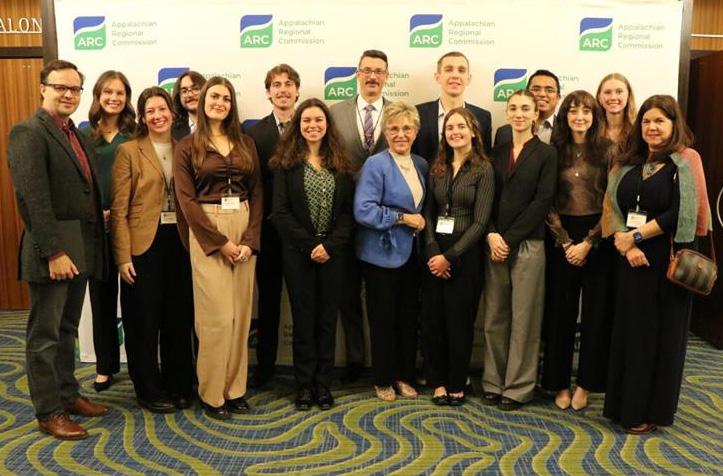



David C. Frederick Honors College
Whether you want to experience the iconic architecture of Fallingwater, learn about the history of the Connellsville Coke Region, go whitewater rafting in Ohiopyle State Park or explore the majestic Laurel Caverns, Fayette County offers family-friendly attractions for the bold and adventurous as well as the curious and inquisitive.
A 2024 CESF Partnership of Distinction, the Appalachian Bridges to the Future project unites Pitt faculty and students with the Fayette County Cultural Trust (FCCT) to support community and economic development in Fayette County.
Daniel Cocks and Michael Edwards of the Fayette County Cultural Trust emphasize the importance of longevity and commitment. Through this 10-year partnership, cohorts of between 10-12 students from four classes engage in community-based research to bolster entrepreneurship and build community connections that support FCCT’s efforts in community development and education.
Working with Pitt students offers residents new education opportunities like learning to build their own Etsy stores or developing apps to support tourism while also providing outside perspectives.
Cocks notes, “One of the benefits to partnering with the University of Pittsburgh is you get students from all over the place, not just the Pittsburgh area–students from out-of-state and even out-of-country. And that gives a whole new perspective. Students come in and say, ‘we’re doing this where we’re from. Maybe it would fit in here.’ So, the benefits of having that sort of diversity brought down to Fayette County is a big plus for everybody.”
As Fayette County is becoming an increasingly popular tourist destination, a variety of perspectives helps address the wide range of ways to interest potential visitors and engage residents in educational opportunities that can advance economic growth.
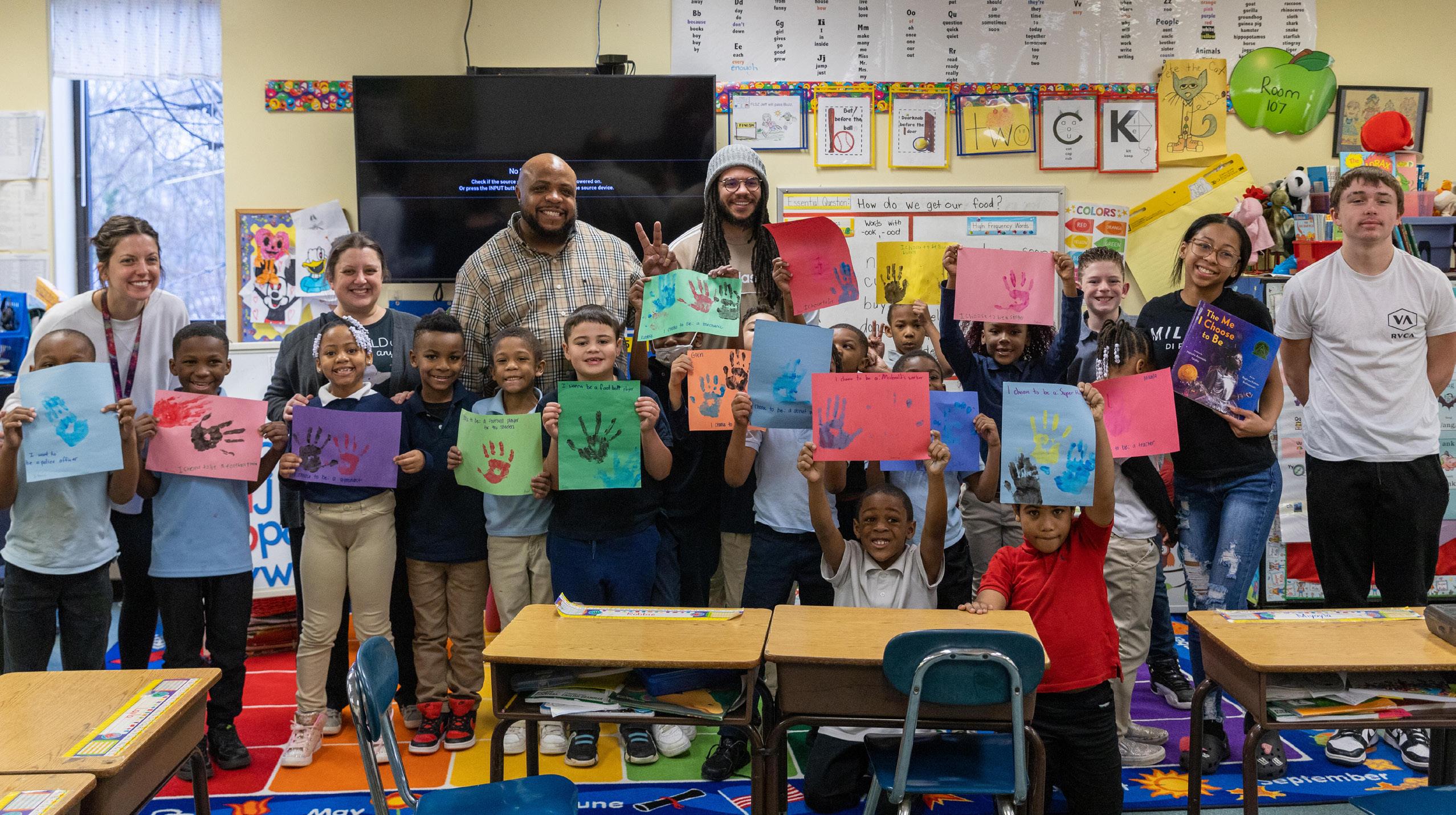

The Pittsburgh Study School of Medicine
The Pittsburgh Study (TPS) is much more than a run-ofthe-mill longitudinal study. It is a program co-developed by scientists and parents, teachers and students, to follow young people in the region from birth to adulthood to better understand what children need to thrive.
The study comprises nine scientific committees that develop and test interventions at several stages of childhood development. Each committee is co-led by an academic researcher and a member of the community.
Take the Steel Valley School District, where TPS has implemented early literacy programs for kindergarteners; in middle school, the Just Discipline Project helps students, staff and teachers rethink approaches to discipline. For older students, interventions include programs centered on reducing violence, rigid gender norms, racism and discrimination.
Dr. Elizabeth Miller, co-director of TPS, founded the study with Dr. Terence Dermody, the Vira I. Heinz Distinguished Professor and Chair of Pediatrics, in 2018. They started
with $8 million in catalyst funding. That has grown to more than $25 million in extramural research funds, Miller said. TPS is supported by UPMC Children’s Hospital Foundation, the Shear Family Foundation, PNC, the Grable Foundation and The Heinz Endowments.
“Money funds both research and advocacy,” said Miller, who is also division director of adolescent and young adult medicine, as well as professor of pediatrics, public health and clinical and translational science.
“We are working diligently to shift our own paradigm of sharing power through curating vulnerable dialogue spaces where we may all see each other’s humanity, so we may truly conduct research with communities instead of on communities,” said Felicia Savage Friedman, co-director of TPS and founder and CEO of YogaRoots On Location.
As a result of these efforts—working not just in communities but with them, the number of participants in TPS reached nearly 18,500 residents.
In 2023, the University of Pittsburgh was awarded the C. Peter Magrath Community Engagement Scholarship Award from the Association of Public and Land-grant Universities (APLU).
The award recognizes Pitt’s outstanding community engagement work exemplified through The Pittsburgh Study, the largest community-partnered intervention study in the U.S. to study thriving among children and adolescents.
“The prestigious Magrath Award demonstrates that The Pittsburgh Study and Pitt’s commitment to the community is among the nation’s most powerful and effective examples,” said University of Pittsburgh Chancellor Joan Gabel.

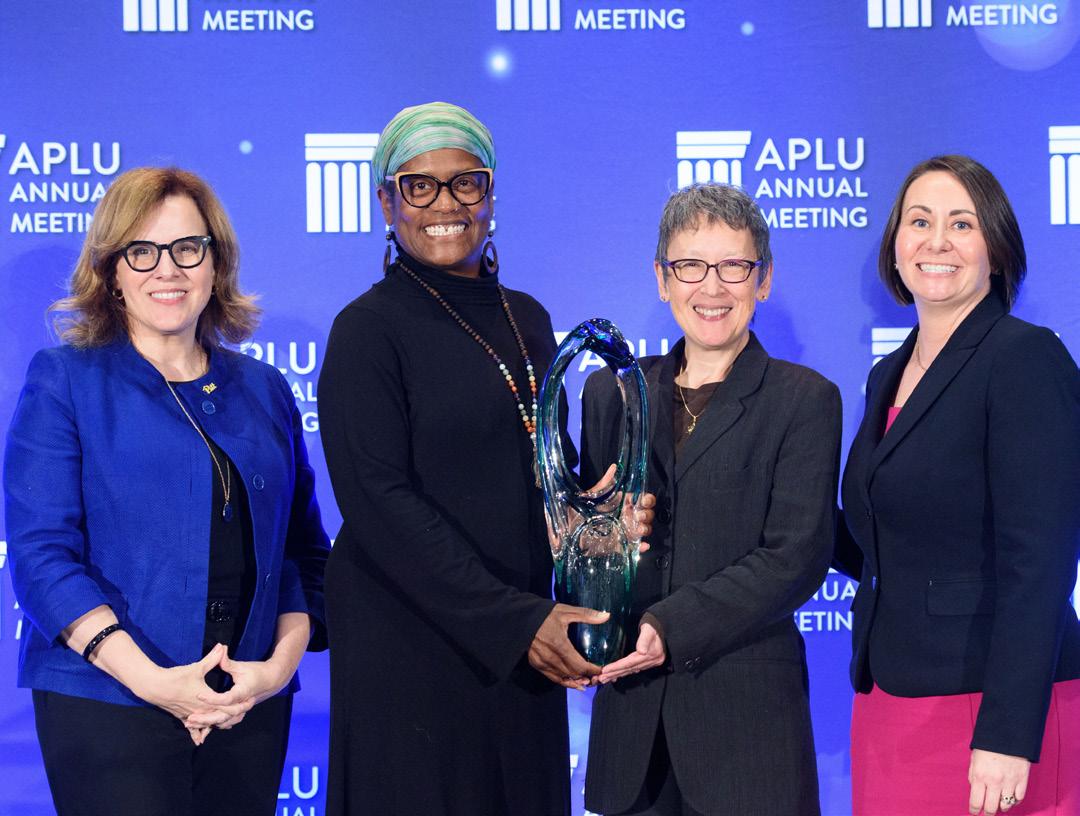
Centering community voices is essential to the work of discovery within our academic institutions.
– Dr. Elizabeth Miller, Co-Director, The Pittsburgh Study

Family Check-Up
When given the tools, parents can plant the seeds for a future harvest their children will reap, and the Family Check-Up (FCU) makes it possible.
For more than 25 years, FCU has provided parents with the ability to manage their children’s behaviors effectively and to build strong and positive relationships with them through practices such as positive behavior support, monitoring and setting limits. The FCU model has been used successfully in diverse
settings from the prenatal period through age 18, such as public schools, health care settings (e.g., primary care, birthing hospitals, WIC) and community mental health agencies.
In 2023-24, FCU became an integral part of Hello Baby, a program designed to support Allegheny County families with newborns and supported by the Allegheny County’s Department of Human Services.
FCU also received new financial support from three foundations to implement their practices into existing programming: Allegheny General’s First Step and Beyond Foundation, Jewish Healthcare Foundation and Amerihealth Caritas Foundation, the latter to support efforts of The Pittsburgh Study’s Early Childhood Collaborative.
1,250
RESIDENTS SERVED BY FCU IN 2023

Meaningful partnerships can often return fruitful results—sometimes literally.
Working together, Mascaro Center for Sustainable Innovation (MCSI) staff regularly meet with Oasis Farm and Fishery staff in Homewood to address needs and co-plan activities. This long-standing partnership has allowed Oasis to gain work support to help meet farm needs while also providing students with hands-on training within the community.
While Oasis is able to expand projects with the support of MCSI and sustainability students, University staff and students are able to gain firsthand insight into local issues and how the community directly addresses them.
MCSI and Oasis co-developed a series of best-practices workshops with Pitt Hydroponics Club students to learn the Oasis method of planting, transplanting and harvesting crops. Learning and practicing these

procedures provide the opportunity for students to be more successful in their club endeavors as well as become better supports to Oasis when participating in service work.
Dr. David Sanchez, Associate Director of MCSI, noted, “The importance of this partnership is that the ideas and projects are co-created. It is another exciting step on a long journey.”

Fall 2023 also featured the Homewood Urban Farm Tour, a first-of-its-kind event in collaboration with MCSI, the David C. Frederick Honors College and local urban farms.
Through the event, students gained exposure to farm practices and learned directly from Homewood community members about why the farms were established and any issues they are facing.
What better way to learn about law than to help real people in realtime? Under the supervision of fulltime Pitt faculty who are practicing attorneys, Pitt law students can do just that.
A part of the School of Law’s Hickton Center for Community Legal Services & Clinical Legal Education is the Immigration Law Clinic, which is designed to provide students with practical experience in representing clients while addressing broader issues of immigration law and policy.
Through the clinic, students have assisted immigrants from more than 60 countries with documentation and legal concerns.
In a conversation with Rosamaria Cristello and Cristina Ballarta Silva from the Latino Community Center, they emphasized that the partnership with Pitt’s School of Law addresses a critical need for the communities they serve.
Ballarta Silva explains, “One of the top needs that we see is the need to connect with a trustworthy immigration attorney because we hear about a lot of scams where families invest a lot of money, and then that money ends up going nowhere.”
Similarly, Cristello expresses the importance of reliable information: “I’m putting my trust in Pitt faculty that they’re checking what the students are doing so that families don’t [receive] misinformation.”
With more than 40 new families reaching out to the Latino Community Center each month, many of whom request assistance with immigration documents, Pitt’s Immigration Law Clinic provides an invaluable service to the community.
Cristello notes that the clinics take the burden off families by providing access to someone who can sit with them and explain
The Jewish Family and Community Services (JFCS) Pittsburgh has also partnered with the Immigration Law Clinic since its inception.
In 2022, with the evacuation of the U.S. Embassy in Kabul, JFCS Pittsburgh received approximately 300 Afghan nationals to provide resettlement services, including legal immigration assistance.
Many of these individuals were eligible for other forms of relief, such as a Special Immigrant Visa, Temporary Protected Status or Re-parole.
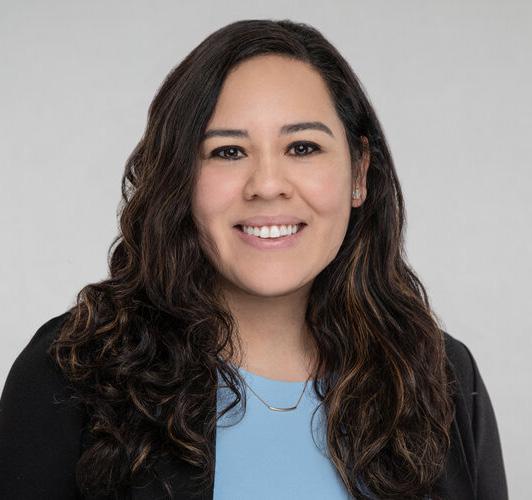

paperwork, making them informed, confident and empowered. The Latino Community Center hopes that students can understand the importance of supporting immigrants through pro bono work and realize how big of an impact they can have on people’s lives.
On a grander scale, they hope students recognize the broken immigration system and the importance of fighting for a reformed structure in which immigrants are humanized and helped. The Immigration Law Clinic, with the help of Pitt Law students, continues to address issues of equity and access, one case at a time.
“We knew that the best place to help them was the [School of Law’s] Immigration Law Clinic,” said
Jamie Englert, Director of Immigration Legal Services at JFCS Pittsburgh.
When researching police and criminal data, people are met by a major access barrier: most data sources about criminal legal systems are decentralized. Although most of these data sources are public, information about arrests, calls for service and use of force reports are likely all housed in different locations, making them difficult to access.
The Allegheny County Policing Project (ACPP) aims to change that by creating a site where users can navigate police departments across the county and locate information–eliminating the barriers union contracts pose to holding police officers accountable.
The ACPP is a working group, made up of students, faculty and community members, within Pitt’s Graduate School of Public and International Affairs’ Center for Analytical Approaches to Social Innovation (CAASI).
The project is funded by a Pitt Cyber Accelerator Grant, the Pitt
Momentum Fund and through contributions from a variety of Pitt capstone teams.
One of the ACPP’s community partners is the Police Data Accessibility Project (PDAP), a Pittsburgh-based nonprofit that locates, describes and shares data sources about police agencies across the U.S. The PDAP’s database organizes and contextualizes data, which facilitates local research through open-source tools.
For Josh Chamberlain, the Executive Director of the PDAP, the partnership with CAASI “represented a good blend of academic analysis and impactbased decision making.” They hope that students and community members involved in the project leave with a deeper appreciation for the importance of transparency in police records.
During their participation in ACPP, student leaders gather commonly asked questions from community
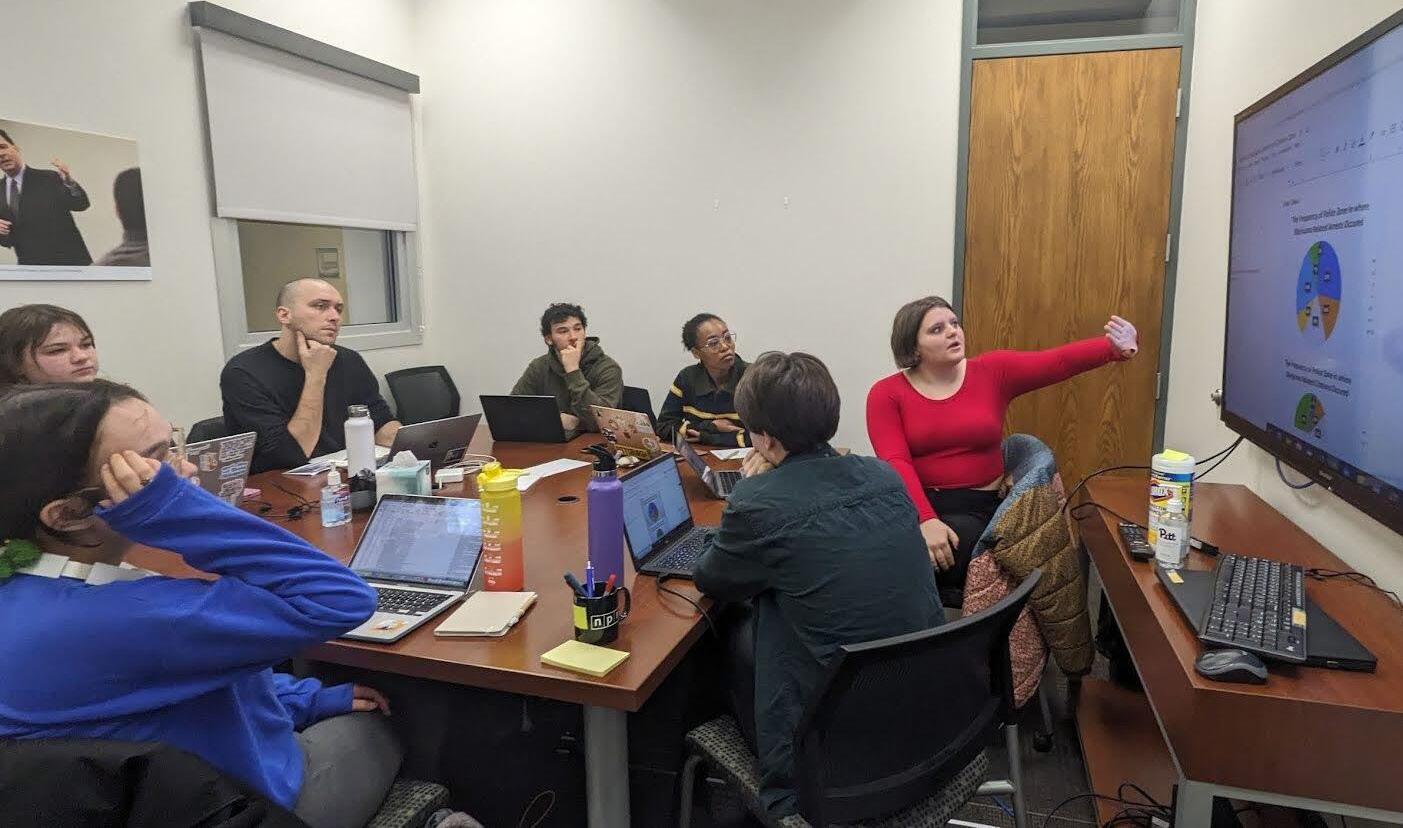

members related to police data. They then find data-driven answers to their questions, or, if there is not enough data available, communicate what is needed to meet the current feasibility of assessing the question.
For Chamberlain, it’s all about the questions. “We measure success by our responses to community questions,” they said. “As we respond to questions, we grow our database of agencies and the data available about each of them.”
The multidisciplinary groups of students involved in this project bring a wide array of skillsets to the project, allowing them to make continuous progress on a variety of different projects. In the process, students learn about the importance of accessible databases, reliable records and data availability.

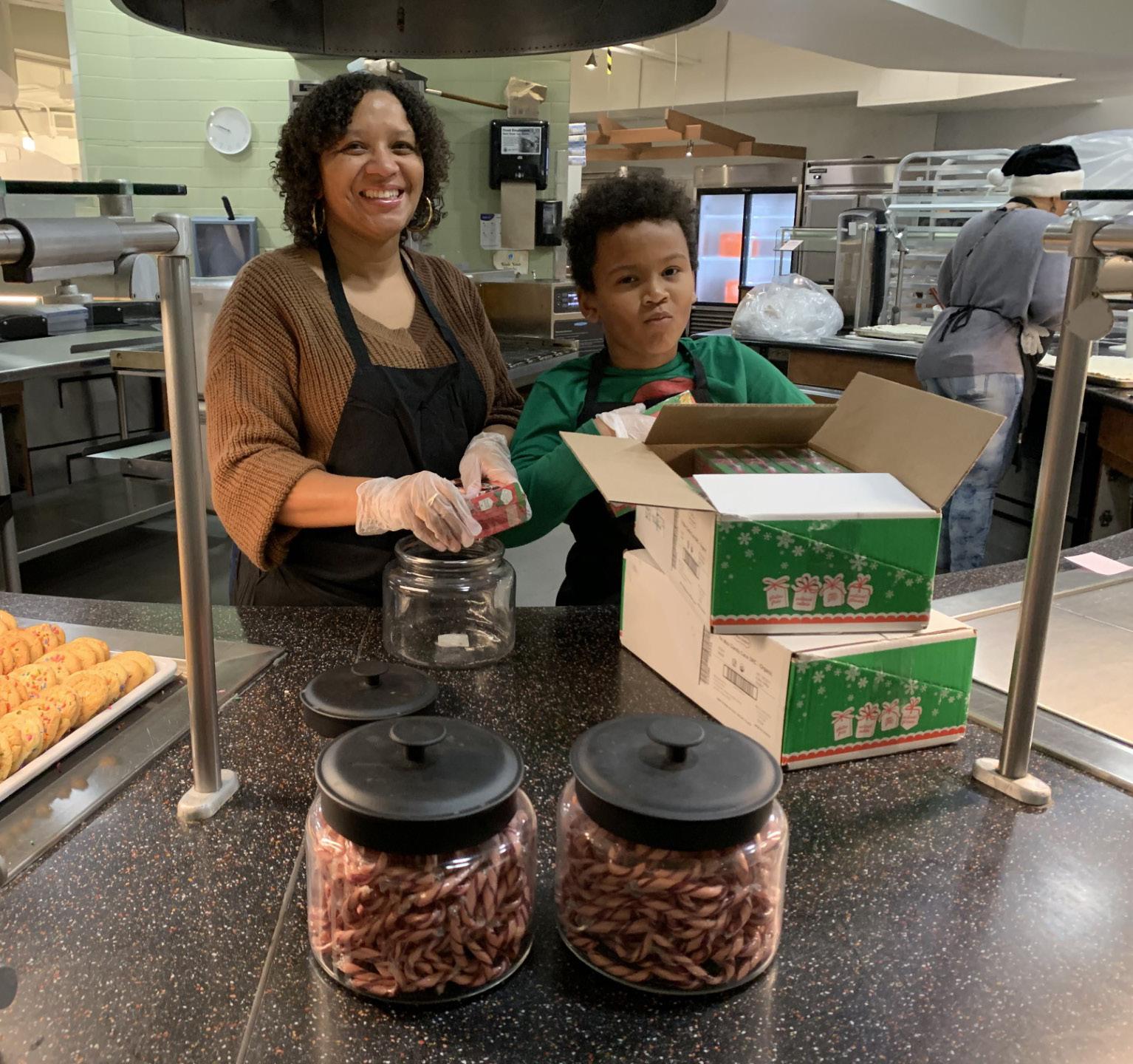

Pitt Eats
No one should go hungry: the maxim that guides the work of the Food Recovery program at Pitt.
The Food Recovery Network, comprising of Pitt Eats and Pitt Pantry team members, unites students at colleges and universities to fight food waste and hunger by recovering surplus food from campus dining halls and donating it to local hunger-fighting agencies.
In 2022-23, the Food Recovery program deepened its partnerships with Food Recovery Heroes, a student-run food recovery organization, and expanded its reach across Allegheny County with 412 Food Rescue, a local non-profit organization that massively increased the amount of donated food.

With the surge in food donations and coordination, more residents were able to have at least one hot meal.
During the winter holidays, a time of giving back and spending quality time with loved ones, there are many in need of both food and connection.
At Christmas Day at Pitt, more than 1,500 nutritious meals were served to community members across the region. To continue providing for Pittsburgh’s food insecure, Food Recovery at Pitt has expanded its list of partners, in turn lengthening the list of recipients.
Yunge Xiao, a 2023 graduate in statistics from Pitt’s Kenneth P. Dietrich School of Arts and Sciences, was named to Campus Compact’s 2023-24 cohort of Newman Civic Fellows.
The fellowship recognizes standout students who are committed to creating positive change in communities locally and around the world, providing them with a year of learning and networking opportunities that emphasize personal, professional and civic growth.
Xiao’s interest in community service and civic engagement took off after serving as an intern for various Pittsburgh organizations and through her classes.
These experiences, along with her interest in data science and promoting social causes, led her to volunteer at the Pitt Pantry where she served as its vice president of impact and assessment. Learning about “the people behind the data,” she said, reinforced for her how statistics can provide a foundation for meaningful community change.
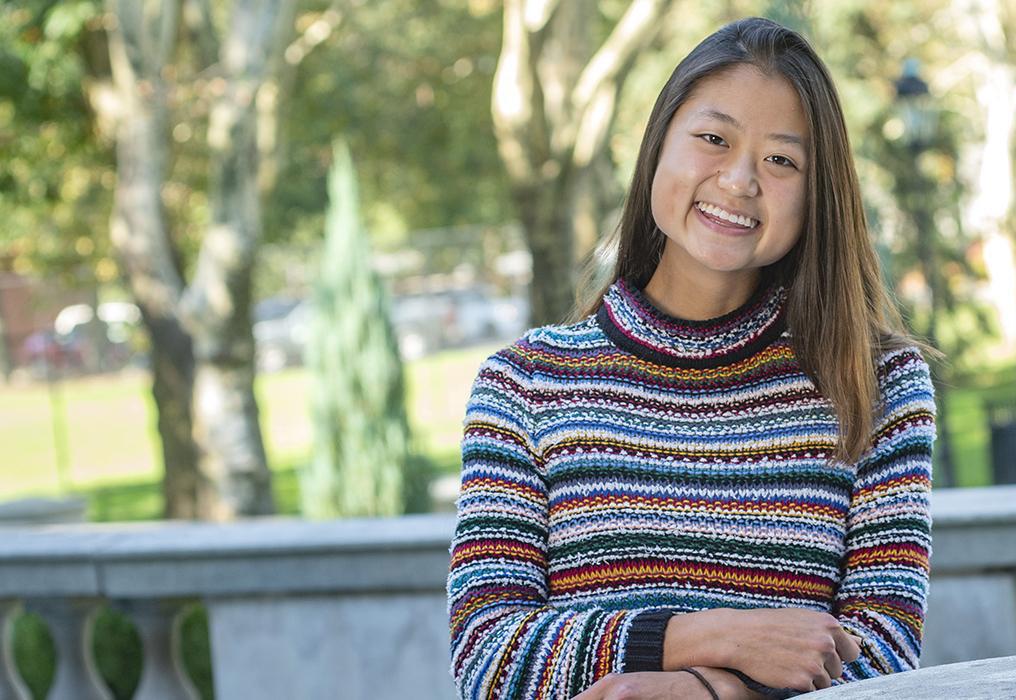

Pitt Tree Tenders
Pitt Sustainability
We can make Pittsburgh’s future greener one plant at a time, which is why the Pitt Tree Tenders program is dedicated to strengthening its urban forest in partnership with local nonprofit Tree Pittsburgh. Trees provide shade, reduce erosion and flooding and improve air quality, making year-round care essential. To help Pitt community members learn how to care for and tend to the region’s tree canopy, Tree Pittsburgh offers a free, asynchronous training year-round.
Seventy-six Pitt Tree Tenders were certified by the end of its inaugural year (June 2023). Two years later, the number of certified Pitt Tree Tenders grew to 176.
In April 2023, Pitt Tree Tenders joined other volunteers to plant 15 street trees in Oakland to grow the area’s canopy.



Graduate School of Public and International Affairs
In 2023, Pitt’s Graduate School of Public & International Affairs (GSPIA) launched the Congress of Neighboring Communities (CONNECT) as an independent, non-profit initiative. Started as an academic initiative to facilitate collaboration with and among regional municipalities, CONNECT continues to build on and expand its important work of fostering innovation and cross-municipal collaboration.
While the program will continue to partner with GSPIA, CONNECT’s evolution to an independent think tank further enables the program to be a true community partner in local government innovation.
Kenneth P. Dietrich School of Arts and Sciences
As a people-oriented watershed organization, Mike Hiller, the Executive Director of Upstream Pittsburgh, explains that the organization’s code of conduct is not a mission statement, but rather a question: How can Upstream Pittsburgh’s approach to watershed restoration uplift climate justice and connect people to the natural environment?
In asking such a big question, they are seeking big solutions, and big solutions require big collaborations.
Upstream Pittsburgh runs a wide variety of programs, and Hiller explains the importance of coordination between like-minded organizations as the key to lasting progress when addressing a largescale issue like water quality. For Hiller, a partnership with the Pittsburgh Water Collaboratory provides an opportunity to connect with institutions throughout Pittsburgh who share a passion for clean water.
The Water Collaboratory likewise values building connections. In
Upstream Pittsburgh and the Pittsburgh Water Collaboratory
2022-2023, they hosted 56 events reaching 1,989 students, faculty, staff and community participants. These activities are crucial to developing lasting relationships with collaborators at grassroots, community, regional and agency levels that lead to the production of impactful research.
In one example from 2024, the Pittsburgh Water Collaboratory was awarded a Phase 1 $650,000 grant from the U.S. National Science Foundation’s Convergence Accelerator (NSF). Working with an interdisciplinary team, including the UrbanKind Institute, Upstream Pittsburgh, the Internet of Water Coalition, the Center for Geospatial Solutions and representatives from the Pennsylvania Department of Environmental Protection and the U.S. Army Corps of Engineers, the team is developing a digital tool that uses satellite data and machine learning to provide information about water quality across Pittsburgh’s (and the entire Ohio River Basin’s) rivers.

The tool will also help communities and decision-makers understand threats to water quality and target opportunities for restoration and recreation.
Projects like this one funded by the NSF grant lean into the impact that arises from organizations bringing their individual strengths together to work towards a common goal, and everyone benefits.
NSF-funded projects like this one accelerate the impact that arises from bringing individual strengths together to work towards a common goal. And, in doing so, everyone benefits: Pitt faculty have better connections with frontline organizations, like Upstream; students learn how this work is done responsibly and effectively; and local organizations get to tap into world class research tools and access people with expertise.
1,989 STUDENTS, FACULTY, STAFF AND COMMUNITY PARTICIPANTS REACHED

56 EVENTS HOSTED

High school senior Laychell Parron was contemplating her next steps after graduation when she first heard about the new Dental Assistant Apprenticeship Program offered by Pitt’s School of Dental Medicine. After dreaming of being a health professional from the age of 10, she saw this new opportunity as a jumpstart to her career in medical care.
The program began with a goal to create more opportunities to diversify the dental assistant workforce and focus on attracting underrepresented minority students from high schools in Western Pennsylvania.
“Like many health care professions, dentistry lacks diversity,” said Kelly Wagner, assistant professor and program director of Pitt Dental Medicine’s Dental Hygiene Program. “As a school, we’re always looking for ways to improve the diversity of our student body, faculty and staff because the more diverse our providers, the better prepared they are to treat our diverse patient population. We think this apprenticeship is a great way to expose minority students to careers in health care.”
Now, the program has developed into a hybrid format offering a combination of online didactic learning and on-site clinical experiences. This transition has allowed the program to enroll a greater number of dental assistant trainees in its second cohort and span across the Commonwealth, including communities in areas such as Erie and Scranton.
Several health industries are currently experiencing an unfortunate shortage of health care professionals, and in dental care this is especially prevalent among critical auxiliary staff.
With the addition of offering the program online, the School of Dental Medicine can train dental assistants right in their own communities, with many completing internship hours in community-based health centers and clinics. This further advances the program’s goal of greater inclusion and access to quality dental care.
With the prominent shortages of dental assistants, staffing trainees in more rural and underrepresented areas, allows for offices to have added capacities for dentists to treat more patients. Not only will trainees learn on their own time, but the program seeks to monitor job placement rates to ensure positions upon completion.
As noted by Dr. Jim Earle, Vice Dean of Operations at Pitt Dental Medicine, “The new hybrid training model allows us to expand immediate access to care in rural areas and also provide training to professionals who will remain in the region, thereby increasing the number of providers who will care for patients in that rural area over the long-term.”
Wellness Pavilion
School of Health and Rehabilitation Sciences
How do you make health and wellness attainable, welcoming and fun? The Community Engagement Center (CEC) in Homewood has the answer.
The School of Health and Rehabilitation Sciences (SHRS) Wellness Pavilion at the CEC in Homewood is a space that aims to make health and wellness services accessible across several Pittsburgh neighborhoods.
The programs, most of which are student-led and faculty supervised, are offered free of charge and focus on the wellness and educational needs of the community. They offer a variety of programs for multiple age groups, including blood pressure education, cooking with kids and exercise and dance classes.
The Wellness Pavilion works with various partners, including Primary
Care Health Services (PCHS). Each Tuesday, PCHS and the CEC in Homewood co-host bingo night, providing food, community and fun with an educational twist.
Each event features themed bingo games, offering health and wellness education on topics such as aphasia awareness and mental health awareness.
Annette Hardy, a Community Health Worker at PCHS, explains, “The program brings some of the community members together to have a good meal, have fun, meet new faces and have something relaxing to do.”
Having a warm, welcoming space where education and fun coexist exemplifies the importance of nights like these.
Awareness programs like bingo night provide a valuable space to
build community, make connections and offer residents valuable health and wellness information in a space where all are welcome.
For Hardy, success for the Wellness Pavilion means providing community members with the knowledge and education they need to improve their quality of life, and they will continue to do so.
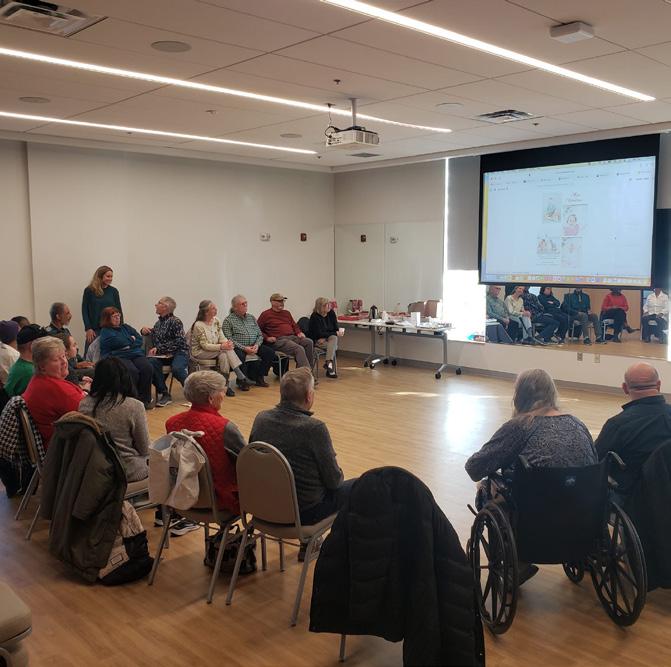

Moms Matter
School of Nursing
On April 12, 2023 in McKees Rocks, Pitt School of Nursing faculty and students in the Moms Matter program joined forces with large health care providers like UPMC and Highmark; family health providers like Sto-Rox Family Health Center and Three Rivers Alliance of Community Health Centers; governmental agencies and representatives like the Allegheny County Housing Authority and WIC Department, Healthy Start, Inc. and Pennsylvania State Police; and local non-profits like A Children’s Place, Hello Baby and Jeremiah’s Place, to share information and resources with expecting parents to ensure a healthy pregnancy and conduct health screenings.
The session was one of many Moms Matter events that involved Pitt School of Nursing faculty and students, who continued to provide postnatal health services. Overall, 50 women continued to receive child health services several months postpartum to ensure a thriving family.


250+ PITT PHARMACY STUDENTS AND RESIDENTS ENGAGED EACH YEAR
At its core, the Grace Lamsam Pharmacy Program (GLPP) and its community partners believe that meeting people where they are is essential to achieving greater health equity. Whether care takes place at one of their partners’ clinics, in a low barrier shelter for people experiencing homelessness or on the street, providing comprehensive care is a priority.
A 2024 CESF Partnership of Distinction, GLPP is one of the longest-running and wide-reaching community pharmacy services in Pittsburgh, emphasizing care in a sensitive manner and helping future pharmacists develop structural humility while working in a team that includes community partners.
The program also engages more than 250 Pitt pharmacy students and residents each year, offering students the opportunity to develop skills by providing high-quality patient care to patients in a community pharmacy setting. For example, some students have participated in the Street Medicine at Pitt program to help distribute medical care to those in need.
Lizzi Patton, Director of Pharmacy of a Federally Qualified Health Center, explains that she started working with GLPP after many years in retail pharmacies because she wanted to experience pharmacy care that was less money-oriented. She hopes the students working with GLPP leave with a similar orientation. She explains, “I’m not going to teach students the biology or the chemistry, but I definitely want to teach them about the barriers that have been put in front of people. And show them that there’s so many resources available.”
When asked what students get out of the program, Patton emphasizes the importance of kindness: “It’s kindness. Kindness, kindness, kindness. When someone is in a bad place, you really need those soft skills.” With students providing more than 9,000 hours of direct service through service-learning experiences, the GLPP is a powerful space for budding pharmacists to learn to develop personal relationships with patients and call attention to system inequities in health care.

All of Us Pennsylvania School of Medicine
As part of the National Institutes of Health-funded research program, All of Us Pennsylvania is an effort to eliminate ‘one-size-fits-all’ medicine. Volunteers across the Commonwealth who participate in the program share health and lifestyle information through online surveys and electronic health records, reflecting the makeup of the American population. With the goal of enrolling one million participants nationwide, this program will become the largest, most diverse resource of its kind and will enable researchers and clinicians to more precisely prevent and treat a wide variety of health conditions.
In 2024, the National Institutes of Health paused the enrollment of adults in Pennsylvania due, in part, to the successful achievement of program milestones and representation of Pennsylvanians in this program.
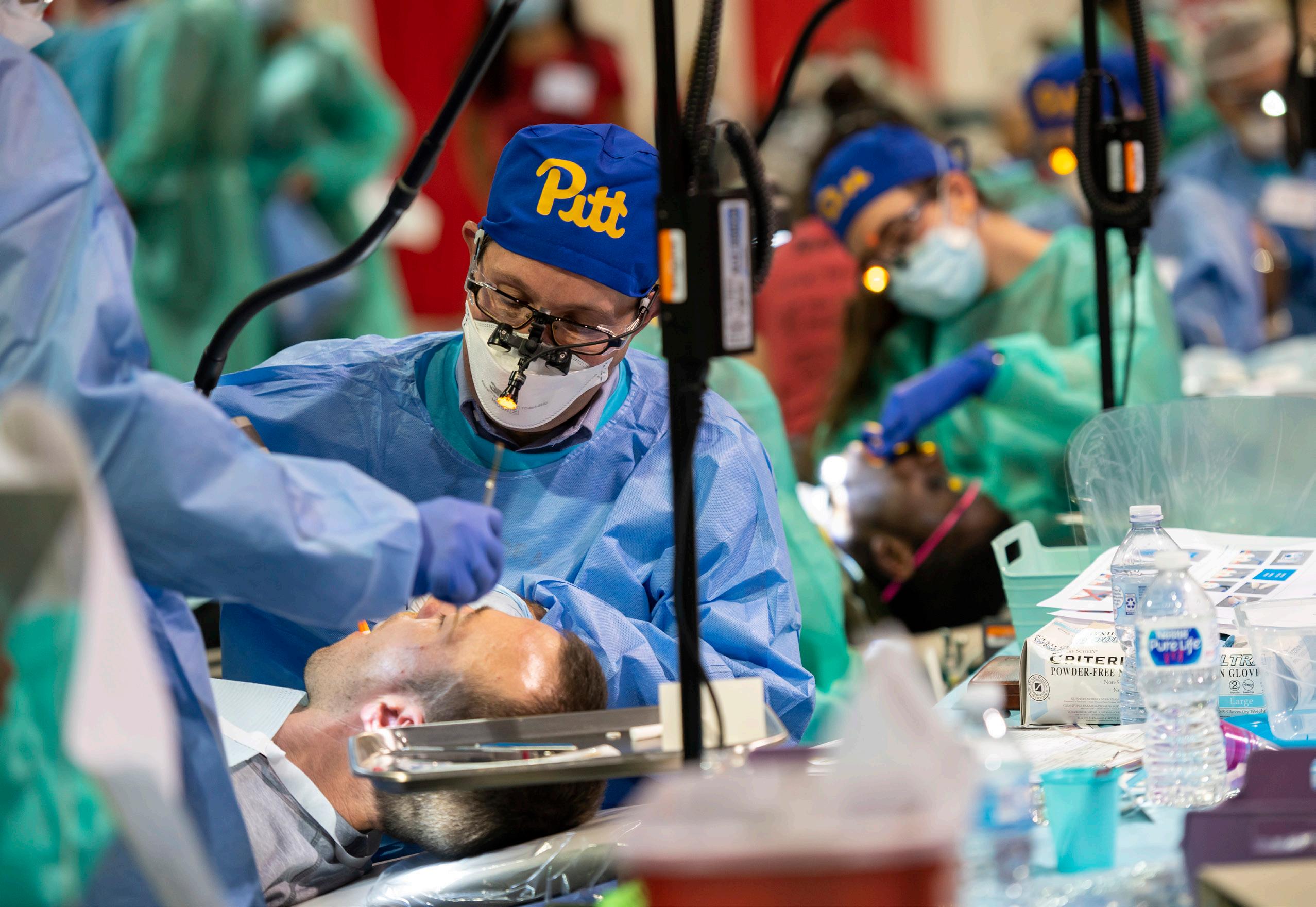
In too many regions of the Commonwealth, both rural and urban, disadvantaged individuals suffer from lack of dental care. According to the Kaiser Family Foundation, there are 148 areas across Pennsylvania that are experiencing a shortage of primary, mental and dental health professionals.
The Student Community Outreach Program and Education (SCOPE) program, which is comprised of two parts (I and II), has been working to provide dental care to these communities and, in doing so, hopefully encourage prospective dental health professionals to practice in these high-need zones.
SCOPE I dental students dedicate a minimum of 50 hours to providing care in a non-dental community setting, such as local non-profits, churches, schools and community centers. Here, this placement allows them to gain greater understanding of underrepresented

communities and their needs, as well as a better grasp on principles of service learning. Students who move forward with the SCOPE II program then spend another two weeks in one of the School of Dental Medicine’s affiliated community health center dental clinics.
For more than 20 years, SCOPE has built strong, longlasting relationships with clinical facilities and the communities they serve. SCOPE students participated in Mission of Mercy and Remote Area Medical events around western Pennsylvania to bring high-quality dental care to more residents.
In 2023, more than 2,500 patients were treated by SCOPE students–consistently contributing to the fight against health care inequity.
2,500+ PATIENTS TREATED IN 2023
When asked about the current iteration of the Research for Equity and Power (REP) project, Dr. Jason Beery, Director of Equitable and Just Greater Pittsburgh, a network convened by the UrbanKind Institute, said, “we wanted to do something really ambitious. And we wanted to do it in a way that demonstrated the ways that community based participatory research should be done.”
The REP project began in 2019 when Dr. Mary Ohmer, an associate professor in Pitt’s School of Social Work, received a three-year $340,000 grant from AmeriCorps.
The first project was led by a partnership between Pitt Social Work and Homewood Children’s Village explored residents’ understandings of equitable development and resident-driven community revitalization.
The project was then replicated in Hazelwood with Center of Life.
Through a series of conversations, residents in Homewood and Hazelwood explored their ability to influence community change by creating an Equitable Development Playbook, a guide that encourages increased civic engagement.
AmeriCorps invited Ohmer to apply for additional funding and so far she has received $566,194, including forward funding, to continue REP with UrbanKind as the community partner.
This second round of programming in 2023 reached new heights, collaborating with Equitable and Just Greater Pittsburgh to bring together residents from several neighborhoods throughout Allegheny County for seven training sessions focused on developing residents’ advocacy and organization skills and building networks across communities.
This connectivity not only establishes wider networks but
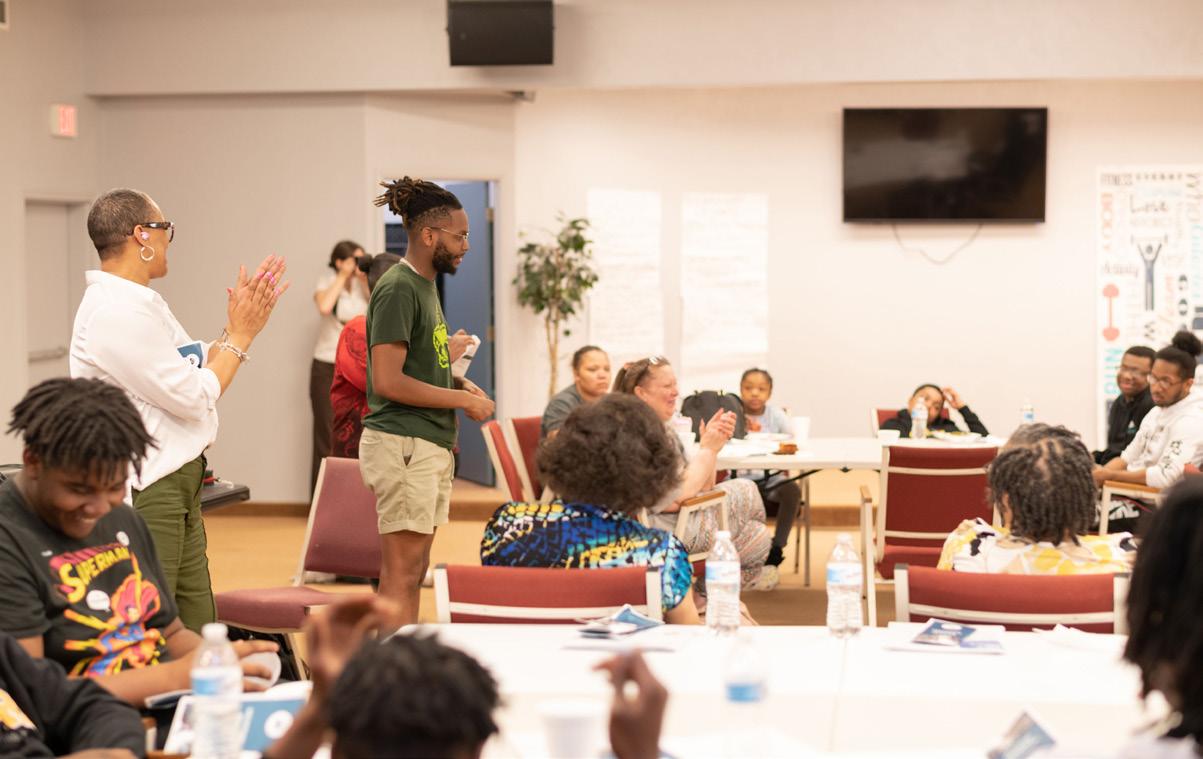
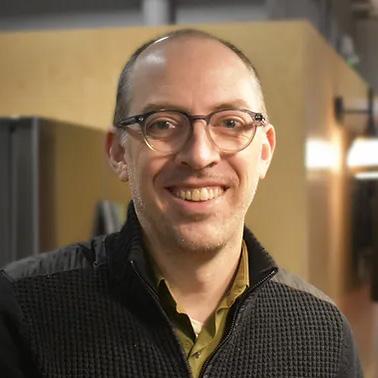
allows residents to access new perspectives and spaces.
Beery hopes that residents leave the program with the confidence and preparedness to advocate for their communities.
“Community programming and research must be transformational for the residents. It can’t just be coming in, doing this training for seven weeks, and leaving. It has to be something more than that, a lot more than that,” said Beery.
Beery also wants to show that it is possible to incorporate research components in community projects in non-extractive ways grounded in serving communities. With the next year underway, the REP program is setting goals to create the transformation they want to see.
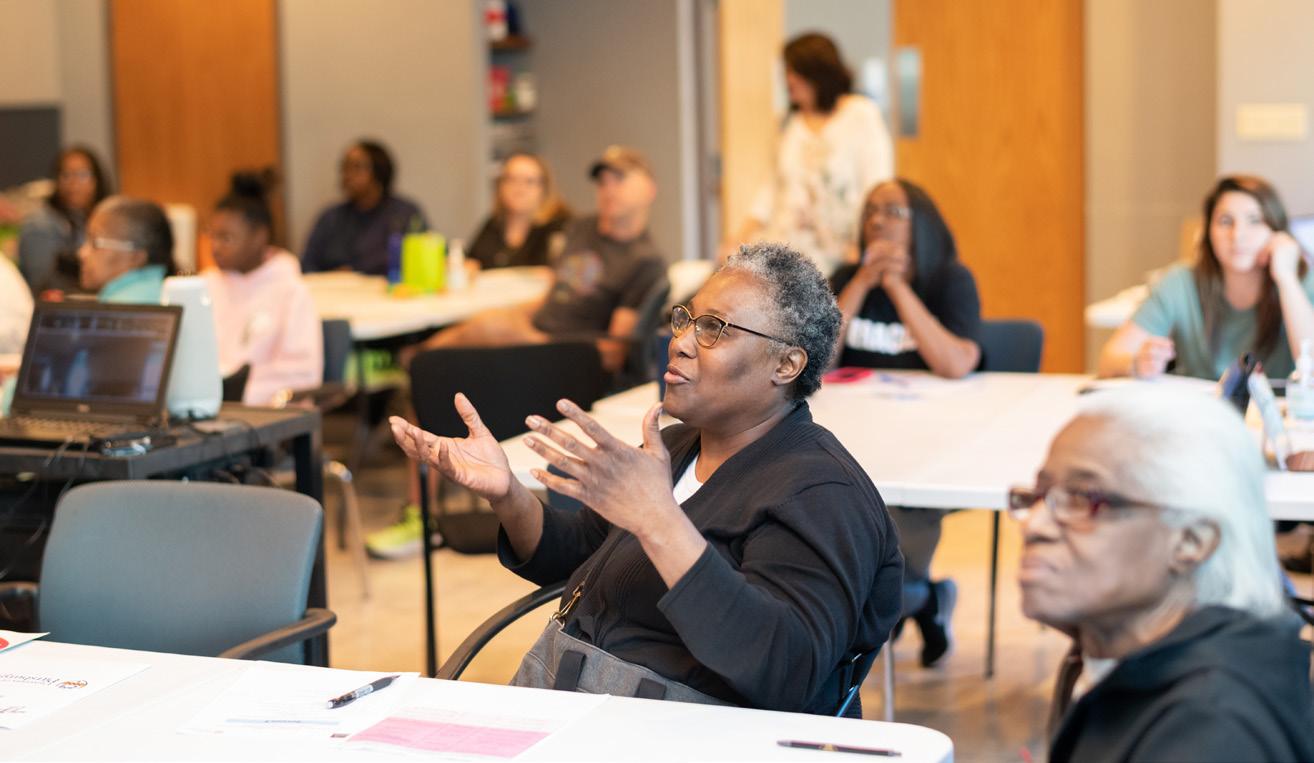
Thriving communities are built on the restaurants, shops, professional services and other local businesses that make up those neighborhoods.
Helping business owners reach their goals is the Community Power to Prosper Program (CP2P), a nocost, six-month certificate program provided by the Institute for Entrepreneurial Excellence’s Urban and Community Entrepreneurship Program.
CP2P is designed for owners of existing inner city businesses interested in entrepreneurship and growth. The program’s goal is to identify barriers and opportunities and develop strategies for growth in sales, profits and enterprise value. In 2022-23, 22 individuals graduated from the program.


Unlike the warm weather that follows it, tax season is not a highly anticipated time of the year. As a result, Pitt Business has supported the Volunteer Income Tax Assistance (VITA) program, which helps low- and moderate-income taxpayers in Pittsburgh prepare and file their taxes. Free tax assistance is eligible for individuals with incomes under $65,000 per year and includes assistance with returns and securing refunds owed from the IRS.
VITA volunteers are comprised of Pitt faculty from the David Berg Center for Ethics and Leadership within the Joseph M. Katz Graduate School of Business and more than 25 students from the College of Business Administration’s chapter of Beta Alpha Psi, the honorary academic fraternity for accounting, finance or business information majors.
For the 2023 tax season, these volunteers completed more than 500 tax returns for both residents of Pittsburgh and numerous international students studying in the region.
Pitt student Aiperi Imankulova describes her volunteer experience as deeply rewarding. As a fluent Russian speaker, she assisted many individuals facing a taxing language barrier when filing their taxes.
“One of the most fulfilling parts was seeing people smile when they learned they [were] eligible for a refund,” said Aiperi. “For some, it was an opportunity to pay rent or buy a much-needed car.”
In previous years, VITA was operated with the United Way of Southwestern Pennsylvania (UWSP). In 2023, the program was expanded to a second site—the Jewish Community Center in Squirrel Hill—and tax preparation trainings led by VITA volunteers were hosted by UWSP and Just Harvest, increasing the number of individuals receiving financial guidance overall.
500+
tax returns for both Pittsburgh residents and international students studying in the region in the 2023 tax season
$1.5 MILLION+ in taxpayer refunds secured since 2002

Pitt’s Neighborhood Commitments are the University’s flagship place-based community partnerships.
The commitments, focused on the Oakland, Homewood, Hill District and Greater Hazelwood neighborhoods of Pittsburgh, provide long-term commitments of staffing, infrastructure and coordination to facilitate mutually beneficial collaborations between Pitt and the local community.
Raub Robinson has worked at the Community Engagement Center (CEC) in Homewood since its opening in 2018 and is as much a staple of the CEC as the building itself.
As the Welcome Attendant, Robinson ensures that each visitor to the CEC has a safe and welcoming experience. “I love my job; every day is different.”
Working with a wide range of Pitt schools, centers and administrative units, offerings at the CEC vary from day to day. One day may include the Institute for Entrepreneurial Excellence


The Homewood and Hill District neighborhood commitments are anchored by Community Engagement Centers (CECs)—vibrant, welcoming spaces that facilitate engaged scholarship and learning, capacity building and economic inclusion.
The Oakland neighborhood commitment is anchored by the Pittsburgh campus.
welcoming a new cohort of local small business owners to their business development program, Community Power to Prosper.
Another day might be welcoming parents and children in for a series of family activities in collaboration with one of Pitt’s community-based partners, Homewood Children’s Village (HCV).
Filling the CEC with nearly 75 family members, HCV Family Nights provide family-strengthening programming provided by both community organizations and Pitt partners. After enjoying dinner from a local eatery, students and
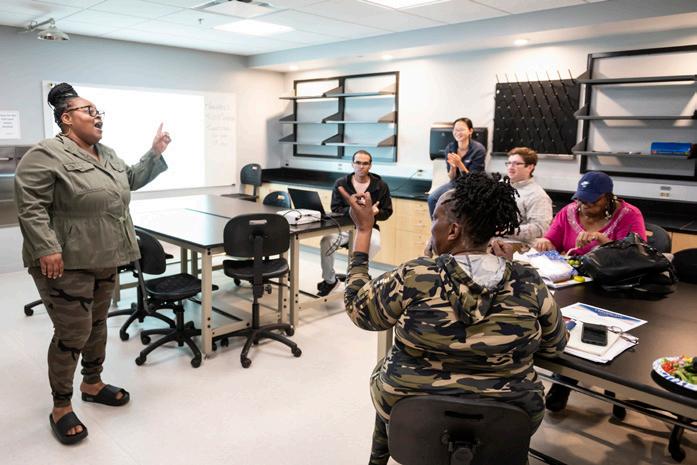
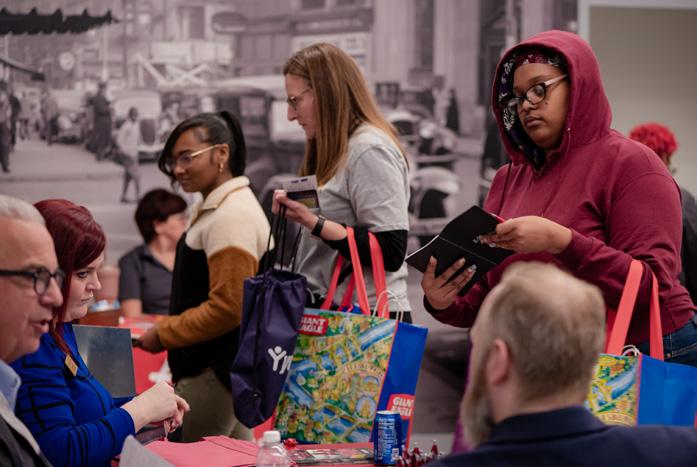
faculty from the School of Health and Rehabilitation Sciences (SHRS) provide families with fun health activities, along with the Mindfulness for Families program, a partnership between Pitt’s Center on Race and Social Problems, Awaken Pittsburgh and HCV.
In fall 2023, the CEC in Homewood also welcomed new leadership with Vernard Alexander now serving as Director. Vernard, along with the three other Homewood staff, work to ensure that the needs of Pitt partners, community partners and Homewood residents are not just met, but exceeded.
2,338 CEC VISITORS IN 2023-24
18% INCREASE IN PITTENRICH TUTORING HOURS
37 COMMUNITY-BENEFITTING EDUCATION AND WELLNESS PROGRAMS OFFERED
CEC.PITT.EDU/HOMEWOOD
A third Community Engagement Center is underway for the Greater Hazelwood neighborhood, which will have a priority focus on harnessing the nearby life sciences corridor (and BioForge) for community-scale opportunities in education, workforce development and inclusive community development.
10,976

TOTAL UNIQUE VISITORS TO THE CECS SINCE OPENING
66% OF CEC BUDGET SPENT WITH LOCAL, BLACK-OWNED BUSINESSES IN 2023-24
163 NEW STAFF EMPLOYEES HIRED FROM OAKLAND, HOMEWOOD, THE HILL DISTRICT AND GREATER HAZELWOOD IN 2023-24
With a bouncy house on Wylie Avenue, students decorating backpacks inside and lively conversation filling the air, it became clear that the first-ever back-to-school block party at the Community Engagement Center (CEC) in the Hill District in August 2023 was a big success.
The gathering was one of many opportunities that can happen on any given day at the CEC. Ranging from digital equity and STEAM education to small business consulting, programming is available for all age ranges, abilities and interests from a variety of Pitt

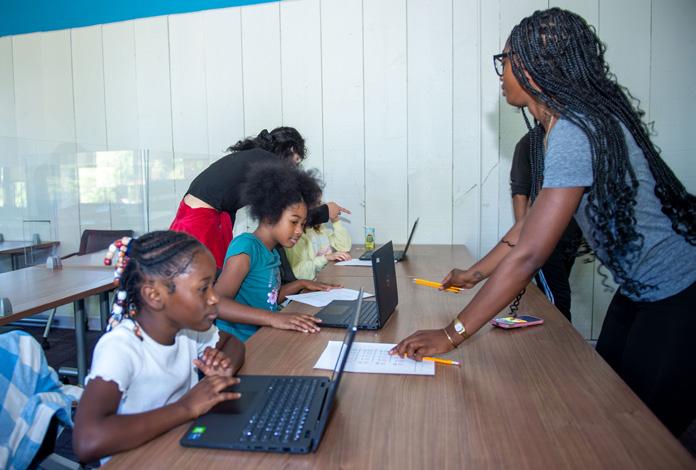
schools, centers and administrative units. Saturdays are for STEAM in the Hill District, while third- through eighth- grade students participate in STEAM Saturdays.
On another day from her office, Kali Mack, Administrative Assistant/Receptionist, is making preparations for an event the following week; participants in the Rehab Neural Engineering Lab adult computing programming course, which specifically teaches Python to adults in the community, will attend a program completion ceremony and receive certificates of completion and stipends.


“I love this part of our work, awarding stipends to participants who stayed the course and worked hard to finish strong,” said Mack.
Kelly Protho, Director of the CEC in the Hill District notes, “We understand how crucial our programming is for the community we serve—for both our youth and adult participants.
These programs are about more than just education—they’re about creating pathways for our community to explore and succeed in a rapidly evolving world.”
1,143 CEC VISITORS IN 2023-24
29 WITH THE DIGITAL INCLUSION STUDIO: ADULT PROGRAMMING PARTICIPANTS
14 HIGH SCHOOL-AGE PROGRAMMING PARTICIPANTS
45 INTERGENERATIONAL FAMILY PROGRAMMING PARTICIPANTS
2016
Plan for Pitt announced; Call for Partnerships released

2017 Homewood and Hill District Neighborhood Commitments announced 2018
October: CEC in Homewood Phase 1 opens
Heidi Ward, Director of the Greater Hazelwood Neighborhood Commitment, knows that it takes more than just resources to build meaningful relationships with the community. “The key ingredients are time and trust.”
Since Pitt initiated its Neighborhood Commitment in Greater Hazelwood in 2022, a team of community and University leaders have explored how the field of life sciences can bring employment and educational opportunities to residents there.
“It’s essential to connect the needs of the Greater Hazelwood community to what’s happening


in the life sciences so everyone can have a say in shaping the future,” said Ward, also a Greater Hazelwood resident.
In February 2024 at Mill 19 in Hazelwood Green, Pitt continued building on its work of bringing together the voices of residents, local foundation leaders, nonprofit staff and University representatives to discuss what this future will look like for everyone.
The daylong Greater Hazelwood Kaleidoscope Summit hosted a meaningful dialogue on the role life sciences could play in uplifting the neighborhood and identified shared
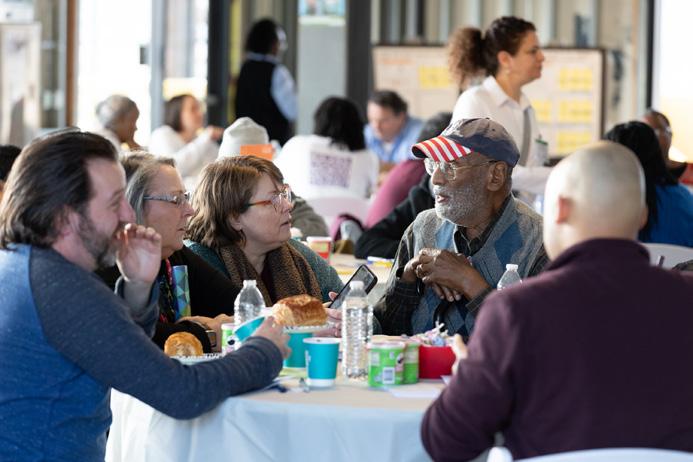

ideas and next steps to move those ideas forward.
Resident Andrea Coleman-Betts, 65, is part of a five-generation lineage living in Hazelwood, and attended to learn how life sciences can benefit younger generations.
“I want my grandchildren and great-grandchildren to have better opportunities,” she said.
“The word ‘green’ [in Hazelwood Green] makes me think of hope and sustainability,” ColemanBetts said. “I want Hazelwood to grow stronger.”
SINCE THE START OF PITT’S COMMITMENT THE GREATER HAZELWOOD TEAM HAS LED, ATTENDED OR PARTICIPATED IN:
65 COMMUNITY MEETINGS
20 OPEN PUBLIC FORUMS
28 TABLING EVENTS
24 STAKEHOLDER MEETINGS OR SITE VISITS
2020
March: CEC in Homewood Phase 2 opens
May: CEC in the Hill District opens at the Blakey Center

The Cathedral of Learning may be an icon for many in Pittsburgh, but it’s the neighborhood in which it sits that truly should have the shine.
With Pitt serving as one of Oakland’s long-term residents, the Office of Engagement and Community Affairs (ECA) partners with a variety of University units to ensure that Pitt aligns the needs of a vibrant campus with enhanced quality of life in the neighborhoods that surround it.
“Being an urban campus, our impact isn’t limited to a campus footprint,” said Justin Dandoy, Director of Community Affairs in


2022
Greater Hazelwood Neighborhood Commitment announced
ECA. “The way we connect with our space and place is unique.”
Efforts include participation in community meetings, trash cleanups, listening to and addressing community challenges and coordinating project development processes with neighborhood stakeholders and government entities.
Through the Be a Good Neighbor initiative, Pitt educates, encourages and engages students on being positive and active participants in the community. Pitt’s Community Ambassadors, part of the Division of Student Affairs’ Off-Campus
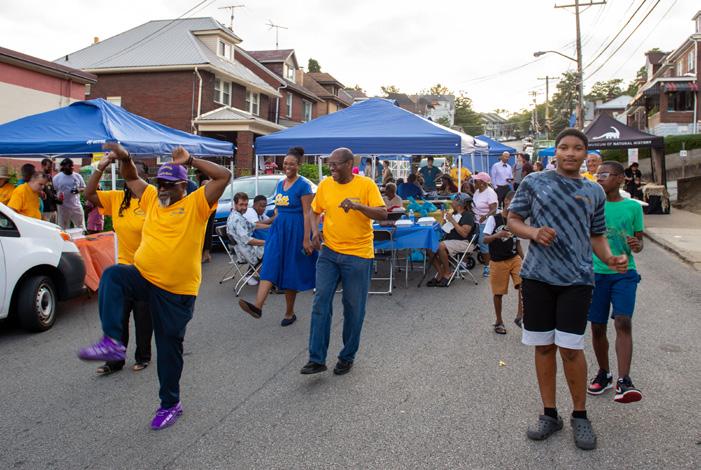
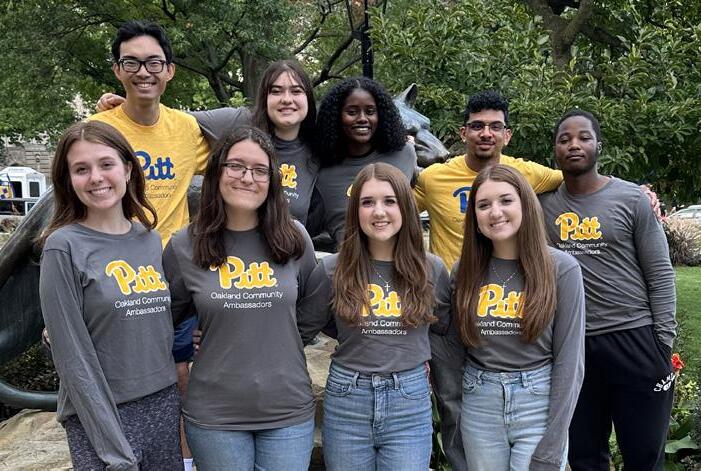
2023
May: Historic New Granada groundbreaking (CEC in the Hill District)
Student Services (OCSS), walk Oakland neighborhoods, engaging with peers and neighbors, providing resources and recruiting volunteers to clean up and help out.
“[The Ambassadors are] the students who are already excited about and invested in this work,” said Anna MacKinnon, Associate Director of Off Campus Experience within OCSS.
“We’re working now on how they can be the leaders that bring that same excitement to other students who may not have thought about this work before.”
22,460 POUNDS OF MATERIAL COLLECTED
The breadth of Pitt’s community impact extends well beyond the Oakland campus, Allegheny County and even the 10-county Southwestern Pennsylvania region.
From Bradford to Johnstown and Greensburg to Titusville, Pitt’s regional campuses are working with their communities, addressing systemic challenges and improving the lives of those that call these regions home.





Located in northwestern Pennsylvania, Pitt-Bradford is minutes from Allegheny National Forest and a variety of outdoor adventures. The campus offers research and hands-on learning opportunities, 60+ student organizations and NCAA Division III varsity athletics.
Pitt-Greensburg is located in the Laurel Highlands of Pennsylvania, an area famous for its picturesque towns and opportunities for outdoor adventure. The campus offers hands-on undergraduate research experience at the Center for Applied Research and 50+ student organizations.
Located in the picturesque Laurel Highlands of Pennsylvania, Pitt-Johnstown offers 100+ student organizations and NCAA Division II athletics teams. Students develop and pitch their big ideas at the Cook Family Idea Lab and hone their digital marketing muscles in the Social Media War Room.
Located in Northwestern Pennsylvania, Pitt-Titusville is just a short trip from Erie, Pittsburgh, and the beautiful Allegheny National Forest. This campus is home to the Education and Training Center, which offers a range of workforce training and education programs. Learn more about the Manufacturing Assistance Center at PittTitusville on Page 21.
Joshua Schuessler of Rixford, Pennsylvania, had already earned 15 college credits—equal to a typical semester—before ever stepping onto the Pitt-Bradford campus as a first-year student.
Schuessler earned those credits as an Otto-Eldred High School student through Pitt-Bradford’s College in High School program, which allows students to earn college credits from certain courses taught by their high school teachers, who are certified through the program. He completed five courses, including algebra, biology and environmental studies, which all counted toward his general education requirement at Pitt-Bradford.
That academic jump-start will help Schuessler, an early level education major, graduate early and save money. “I highly recommend the program to high school students,” he said.
College in High School is one of two programs at Pitt-Bradford in which high school students can earn college credits. Now in its 20th year, the program has grown significantly and become one of the largest of its kind in Pennsylvania. During the program’s first year, 32 students from five high schools participated.
By 2024, 1,216 students from 30 high schools are taking a total of 2,217 classes, earning 7,251 college credits.
By reading the same book, we can build a sense of community. That’s the belief of Westmoreland Reads, Pitt-Greensburg’s common read program, where campus and community members can learn to look at the same book through an interdisciplinary lens, make connections and engage in conversations with others across disciplines, interests and age groups.
The program brings campus and Westmoreland County communities together to engage in learning by reading and discussing books that present a diversity of themes that cross disciplines.
The program boasts 17 community partners— including neighboring colleges, places of worship,
Over the past three years, Pitt-Johnstown, together with their partners in Vision Together 2025, area businesses and educational institutions, has been working to establish a downtown center to boost workforce development, strengthen the local economy and enhance quality of life.
“We are excited by this collaboration with numerous partners including city leaders, legislative champions, Vision Together 2025, the RK Mellon Foundation and various partners in industry, nonprofit and educational institutions. Our ability to fulfill our educational mission is intricately connected to the health of the Greater Johnstown community and the surrounding region. FutureReady will further reify our robust commitment to the community and catalyze
nonprofits, museums, libraries and more located in Westmoreland County that assist with facilitating the program.
In addition to providing materials to guide classes and book groups in their reading and discussion, the Westmoreland Reads committee also offers programming linked to the themes in the book being read throughout the year.
Much like the book choice itself, programming is intended to capture the interests of a range of age groups and interests. Previous programming has included historical talks and tours, author lectures, crafts for kids and other interactive workshops.

various ongoing efforts to revitalize the city,” said PittJohnstown President Jem Spectar.
Pitt-Johnstown recently entered into a lease for the former Jupiter Building adjacent to Central Park, where they plan to provide educational programming to support industry needs and workforce development in areas like engineering, computer science and entrepreneurship.
“When planning and funding expectations are fully realized, Pitt-Johnstown will help operate FutureReady, a collaborative epicenter of innovation, creativity and entrepreneurial engagement to support workforce development and job training,” said Spectar.


» Explore the Engagement and Outreach Map: engagementmap.pitt.edu
» Sign up for ECA’s newsletters: community.pitt.edu/newsletter
» Volunteer with the Pitt community: volunteer.pitt.edu
» Give to Pitt and transform tomorrow: giveto.pitt.edu
» Attend the Community Engaged Scholarship Forum: cesf.pitt.edu
» Visit the Community Engagement Centers: cec.pitt.edu
